




















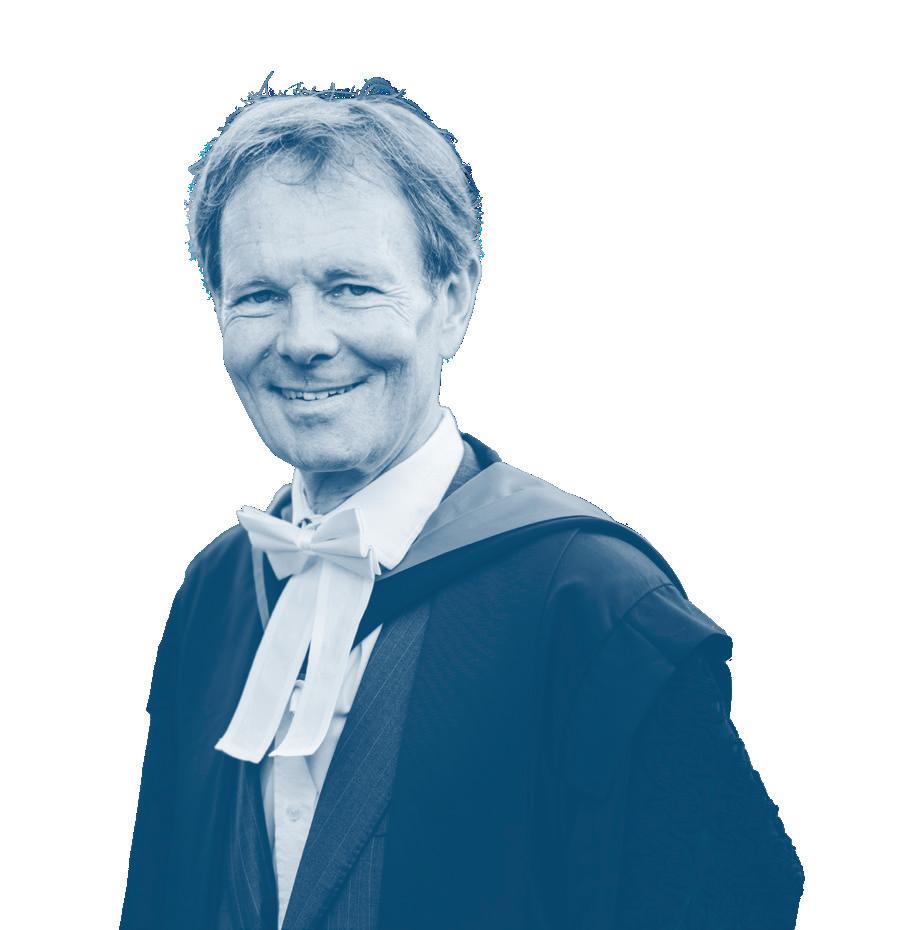
Since its founding, Kellogg has embodied immense ambition–a vision to redefine an Oxford education by challenging conventional perspectives. As I reflect on our journey over the past few years, I am proud of the strides we have made as a community. Our commitment to enhancing the collegiate experience of our students has been unwavering – with this being the driving force behind our Strategic Plan (2018-2024). Our aim: to ensure that many more of our students can reside on site, and sustain a whole range of student clubs and societies, enriching College’s academic, cultural, sporting, and social activities.
When setting this goal, there was no guarantee it could be delivered; perhaps, like many other colleges, we too might have to explore alternative accommodation options situated at a distance from our site. However, I am delighted to share that we have successfully achieved agreements with the University to establish a ‘west campus’ on the facing side of Banbury Road,
whilst continuing to expand our existing site between the Banbury, Norham, and Bradmore Roads.
Our College’s next Strategic Plan (20242029) will be dedicated to harnessing these opportunities. The Finance Bursar’s feature (page 8) describes this ambitious project, designed to triple the number of students living on site, and offer them a broader range of support and activities.
This year the Middle Common Room (MCR) has been teeming with diverse and inclusive activities. By the end of Hilary term, the MCR Committee had hosted over 80 events (page 6) under the leadership of our student President, Eeshani Bendale, who I am proud to say was selected to join the UN Commission on the Status of Women.
Other College members continue to make notable contributions within Oxford and globally. Dr Hilary Wynne is representing the University’s postdoctorate and early career researchers on the University Council; she is tirelessly promoting Kellogg’s Research Member of Common Room and JRF schemes (page 17). Our Fellow King Charles III was the only Head of State to be invited to address COP28. His powerful address underlined the reason he was made a Fellow in 2020 as the then Prince of Wales, and why the Fellowship
continues today – namely our shared commitment to environmental sustainability. It is fitting that our latest appointed Bynum Tudor Fellow was the driving force behind the Paris Agreement, and the UN’s Sustainable Development Goals, Ban Ki-moon (page 28).
Our work on environmental sustainability continues to be championed by the Global Centre on Healthcare and Urbanisation (page 59) and the Centre on Mutual & Co-owned Business, reinforced by both of the University’s Net Zero Fellows – Dr Alice Evatt and Dr Stuart Jenkins – being assigned to Kellogg (page 62). Our new Commission on Sustainability Data will recommend ways in which the environmental performance of companies can be better evaluated. This could be a gamechanger in the world’s battle against climate change (page 59).
Our Artist in Residence Scheme has been strengthened with the addition of Brian Cox (page 18), and our new Writer in Residence Scheme has proved a huge success (page 25). Furthermore, we’re pleased to announce the establishment of a reading room dedicated to Local History, a subject dear to many College members. Thanks go to one of our Founding Fellows Dr Kate Tiller OBE, who has generously pledged a legacy gift to College, as well as her local English history library (page 54).
“It is fitting that our latest appointed Bynum Tudor Fellow was the driving force behind the Paris Agreement, and the UN’s Sustainable Development Goals, Ban Ki-moon.”
— Professor Jonathan Michie
Kellogg alumni are making an impact around the world. Ottilie Klein (2009, Women’s Studies) is making her mark in the German Bundestag (page 40), Sara Berkai (2020, Education) is using her entrepreneurial instinct to enhance learning for children (page 47), and Ali Tareen (2017, Business) has established the Tareen Oxford Scholarship at Kellogg, enabling others to follow in his footsteps (page 44).
Our alumni continue to promote our college globally, as you can read about with Rudra Chatterjee (2021, History of Design) and Urvi Khaitan (2017, History) in Kolkata (page 42), and Seung Chong (2019, Taxation) in Hong Kong (page 38).
These successes are due to you, the College community: students, staff, alumni, and academics. I am proud to contribute my small part, and to call myself a member of Kellogg College.
I hope you enjoy the contents of this magazine, and that you share that same pride in our successes.
The University of Oxford has ambitious plans for growth in its graduate student numbers and research capabilities. Though Kellogg may be among the youngest colleges, it is set to play a key role in enhancing the global appeal of Oxford, facilitating the growth in student numbers, and supporting the best international scholars in their research and career development.


Words by Gary Walker Fellow and Finance Bursar
Kellogg’s vision for the future is perfectly in harmony with the vision of the University –to make Oxford’s excellence in research and teaching available to the best global minds in furtherance of their lifelong learning and a more informed world.
Some simple numbers illustrate the key role that Kellogg already plays in making the University vision a reality. Of nearly 27,000 students at Oxford, around 13,920 are graduate students. Of those, approximately 1,377 call Kellogg their collegiate home – 10% of the graduate student body. It’s only natural then that Kellogg should be an integral part of catering for graduate students in the years to come. And that is why the College has plans to increase its capacity, enhance the student experience, and continue to place excellence in lifelong learning at the heart of its ambitions.
Michaelmas term 2024 will see the start of the first phase of planned expansion for Kellogg. For some years discussions have been under way for the College to take on a number of properties on the west side of Banbury Road opposite our current site. This ‘West Campus’, as it has been named, will see the stately period villas refurbished, with some new building development in the space between those and the properties facing Winchester Road.
To the east, on Bradmore Road, further properties will be added to the Kellogg portfolio. Together, this will provide twofold benefits for the College. Firstly, the overall footprint of the campus will grow, and an expanded single-site location emerge and bind together. Secondly, it will mean a radical expansion in the provision of on-site rooms for our students, rising from the current 82 to around 220.
The plan is far from being just about providing students with a place to lay their heads however. The projects will provide more study, communal, and leisure space, and together with landscaping of the gardens, will create an environment that will serve social, wellbeing, and leisure pursuits as well as the academic activities.
Continues on next page.
The ambitious plans for Kellogg come at a price, with an investment of around £25m envisaged to carry out all of the planned phases. The projects will rely on the generosity of donors to see them fully bear fruit.
Whether it be from institutions, trusts, commercial organisations, our alumni, or appreciative individuals who understand our vision, Kellogg is enormously grateful for the donations our supporters make to provide for scholarships and campus development. The ambition of the college is that the quality of the surroundings should match the brilliant thinking of our scholars, creating a hub of excellence in every respect.
The Kellogg LEAD campaign, which seeks to raise the £25m required launches in 2024 and so named to reflect the College’s leadership in innovative practices within the University, and its ambitions for its international academic community.
These exciting plans will boost Kellogg’s capacity at just the right time. It will not only allow us to provide for more full-time students but also enhance the experience of part-time students when they make their visits to Oxford – an integral part of graduate research and lifelong learning at an Oxford college. It will make us a leading piece of the framework that will see more graduate students commit to Oxford as the place to do their research and expand their academic horizons.

Existing Kellogg site
Next 3 year development West Campus
66
The West Campus development and allied projects are a pivotal moment in the history of Kellogg College. It will allow for more students to be accommodated on site, enriching the dynamic international community, and increasing interdisciplinary collaboration.
The plans include expansion and improvement of existing facilities such as our catering operations, to support the growth in student numbers.
The project will provide an innovative approach to unify buildings originally conceived as separate entities, yet pay respect to the architectural and cultural heritage of its Norham Manor location.
In time, further Victorian villas in the area will add to the campus as Kellogg matures and becomes an ever more significant part of the University of Oxford’s global appeal.
Since its foundation, Kellogg has grown its campus through high-quality renovation and sustainable original development, that has allowed the college to grow and enhance the student experience on site
Foundation of College
Our mission to offer flexible lifelong learning begins at Rewley House, Wellington Square, Oxford
1992
The college presents its first students for matriculation into the University
1994
The college is renamed Kellogg College in recognition of the generosity of its original benefactor, the W K Kellogg Foundation
The Chancellor, Lord Patten of Barnes, officially inaugurates our new site
9 & 10 Bradmore Road are acquired, providing additional student accommodation
2008
Kellogg expands into 60 Banbury Road and the Balfour Building, creating links between the old and the new, and providing enhanced College facilities including meeting rooms and a library
2006
Kellogg acquires 62 Banbury Road, which houses the Administration team
1996
The first part-time DPhil students are matriculated
2005
Kellogg begins its move to its current site on the Banbury Road, North Oxford, acquiring 7 & 11 Bradmore Road for student accommodation
Donald Michie House and Anne McLaren House open, providing further student accommodation, the renovations of which are commended in the Oxford Preservation Trust Awards
2017
Kellogg builds and opens the Hub – the University’s first building built to sustainable Passivhaus standards. 8
Bradmore Road is acquired providing further student accommodation
2023
49 & 55 Banbury Road are acquired for additional student accommodation
Kellogg’s West Campus

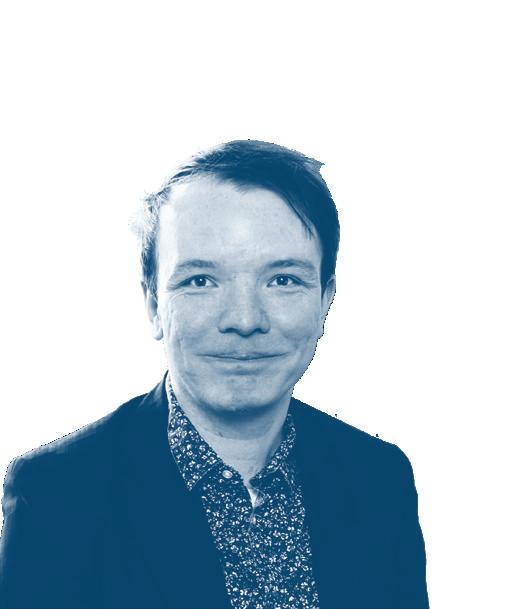

Privacy is an important consideration in the life of Kellogg Fellow, Dr Max Van Kleek. It’s an issue at the heart of his current research, and an important factor in his decision to accept the role of LGBTQ+ Fellow in the college.
Max freely acknowledges that his work is hard to characterise. He started his academic career as what he calls a ‘conventional computer scientist’, but as he progressed became increasingly drawn to the study of human-computer interaction.
Vannevar Bush’s 1945 paper ‘As We May Think’ was a big influence: ‘It fuelled my interest in cybernetics and how computers could and should extend our capabilities.’ In the paper, Bush, who was instrumental in preparing the ground for the Manhattan Project, argued that computers could help us to live better lives, make better decisions, and extend our ability to be human. ‘By making better decisions, we would live better together was the thinking,’ explains Max, ‘But of course, when we look at life today technology is making life more complicated, when the initial aim was to make it easier.’
The issue of privacy is one aspect of modern life that has become extremely complicated. He lays out the problem: ’There was a time when privacy was about information spread across your interactions in life, or the sight of nosy neighbours looking through their curtains. Now, our entire lives are tracked and our behaviours catalogued. Organisations are making vast profits from
“Simple apps like flashlight apps, simple games, all can be collecting data. There is a reason why they are free.”
— Dr Max Van Kleek
trading in personal data whether for benign or malicious objectives’.
looking apps can be a risk factor too.
And Max cautions that we are at risk in the everyday, and too easily compliant.
‘Our data exposure isn’t limited to specific interactions these days,’ he says, ‘we all carry smartphones – always about your person, always on.’ And according to Max’s research it’s not just overt data intensive smartphone apps that harvest our data, more innocent
‘Simple apps like flashlight apps, simple games, all can be collecting data. There is a reason why they are free.’
The implementation of this large-scale data collection is itself the work of computer scientists and software engineers, and academia relies on the collection of data. Is there a tension inherent in this? Max appreciates the irony but trusts in academic integrity. ‘In academia we don’t have units to sell and profits to make –our mission is to understand, to inform policy and regulation. It’s true that those of us researching in this area have not won friends in certain sectors through having this utopian view that technology should not harm,’ he concedes.
Where Max has made allies is through the interdisciplinary nature of this work, which is the domain of social scientists, psychologists, and others, as well as computer scientists. In that respect, Max feels he has found the perfect home within Kellogg College.
“There are many ways we can use technology to focus on and support the LGBTQ+ community, and
that’s something I would like to explore.”
— Dr Max Van Kleek
‘Many classically structured institutions find it difficult to embrace these fields. They see the focus as technological and mathematical, and adhere to that purist view. Kellogg is open to new things, and sitting down alongside colleagues at lunch is to have a wealth of interdisciplinary conversations that stimulate thought and highlight avenues to explore.’
His appreciation of the college and its values has led to Max assuming the role of LGBTQ+ Fellow. As well as being a voice for LGBTQ+ perspectives within Kellogg, he is currently engaged at senior levels within the University in formulating policy for the future. Deciding to take on the role came after reflecting on the implications it would have for his own privacy. ‘I’d always kept my personal and professional lives separate I suppose,’ he recounts, ‘yet over the last few years I have become increasingly conscious that my right to enjoy my private life as a gay man, and not to have it impact my professional career, has been built on
the experience of my heroes, people like Christopher Strachey and Alan Turing who were done great injustice because of their sexuality.’
Again, Max felt reassured by the culture of Kellogg College, confident that as an institution it was value-centred and
would embrace change and new ideas if required.
‘I must say,’ Max admits, ‘when I accepted the President’s invitation to be the LGBTQ+ Fellow, I didn’t really know what being an LGBTQ+ Fellow meant. However, I’m embracing the role. I’m using my voice and involving myself in the debates around trans and other LGBTQ+ issues across the University, among the undergraduate student body, other academics, and the institution as a whole. I feel ready to be an activist as well as an advocate.’
And Max has ambitions that might bring his research and activism together to make life better. ‘There are ways we can use technology to focus on and support the LGBTQ+ community, and that’s something I would like to explore.’


In 2021 Oxford introduced the role of Early Career Research Representative on the University Council. Kellogg Research Member of Common Room Dr Hilary Wynne took up the role.
Hilary is an ardent champion of representing fixed-term research staff and appreciative of Kellogg College’s exceptional support, allowing her to contribute to an inclusive research environment.
‘As the Early Career Research Representative on University Council, I represent the many thousands of fixedterm research staff at the University; I endeavour to highlight the issues that these postdoctoral researchers face,’ she explains.
‘One of the key such issues is the lack of a college affiliation. There are twoway benefits to researchers having college associations, yet many colleges remain reluctant to offer associations to postdoctoral researchers such as myself. An exception to this rule is – and always has been – Kellogg.
I am thoroughly grateful for the College’s extremely supportive and involved attitude towards me – and, indeed, towards my representation of all fixedterm research staff at the University.’

“As the Early Career Research Representative on University Council, I represent the many thousands of fixed-term research staff at the University; I endeavour to highlight the issues that these postdoctoral researchers face.”
— Dr Hilary Wynne
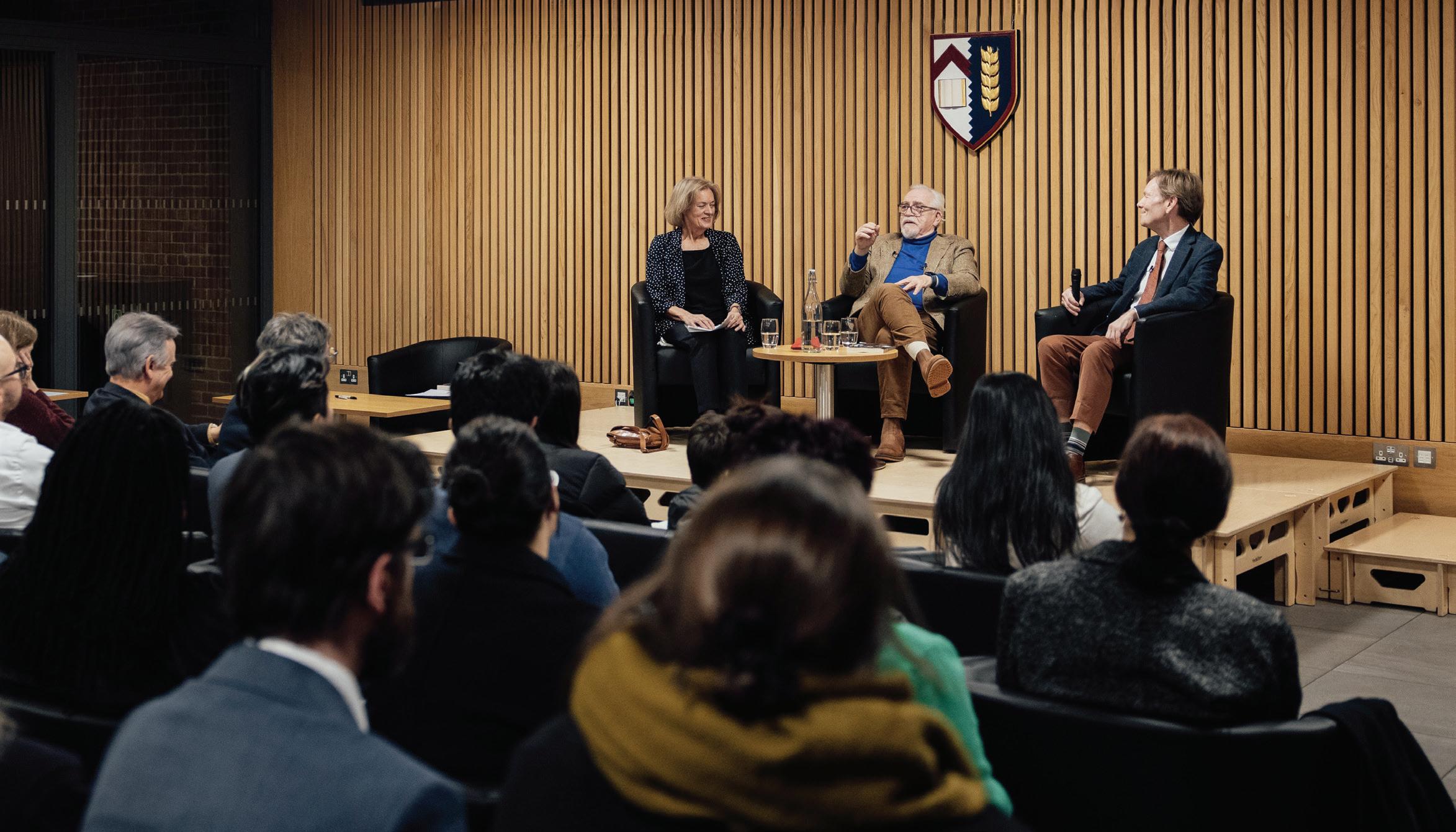
him as a memorable and haunting iteration of the infamous serial killer.
critically acclaimed television series
Cox’s cinematic journey continued with notable roles in Braveheart (1995), where he portrayed the historical figure Argyle Wallace, and The Bourne Identity (2002), where he played the menacing antagonist. In recent years, Cox’s profile has risen markedly with his compelling performance as Logan Roy in the
Succession. As the patriarch of a media empire, Cox’s portrayal of the ruthless and complex character earned him widespread acclaim, including a Golden Globe Award for Best Actor. His work on Succession not only showcased his ability to navigate the nuances of a morally ambiguous character but also demonstrated his adaptability in the rapidly evolving landscape of television.
for Creative Writing for an ‘In conversation’ session to mark the beginning of his time as an Artist in Residence in the college
film and television, Cox’s presence is a testament to the transformative power of acting.
“Actor—character—text. That’s all there is.”
“Lear’s tragedy is all the more piercing because Cox so magnificently conveys, before madness, his perplexed, comic humanity…”
— Theatre Critic
Beyond his on-screen achievements, Brian Cox’s commitment to the arts extends to his advocacy for theatre and education. He has been a vocal supporter of drama schools and has actively participated in initiatives to promote the performing arts. Cox’s dedication to nurturing the next generation of actors reflects his understanding of the importance of mentorship and the enduring impact of theatre on society.
As an actor, Brian Cox’s legacy is defined by the indomitable spirit with which he approaches his craft. Whether he’s breathing life into Shakespearean characters or adding depth to contemporary
In appreciating Brian Cox, one cannot overlook the authenticity and humanity he brings to every role. His performances are not mere portrayals but profound explorations of the human condition. Whether commanding the stage with his booming voice or subtly conveying emotions through his expressive eyes, Cox’s artistry captivates audiences and transcends the boundaries of time and medium.
In an industry that often prioritises youth and trends, Brian Cox stands as a venerable figure whose talent has only grown richer with time. His enduring career serves as an inspiration to aspiring actors, a testament to the enduring power of dedication, passion, and a deep love for the craft. As audiences continue to appreciate his contributions, it’s evident that Brian Cox’s legacy will endure as a beacon of excellence in the world of acting, a reminder of the profound impact that a truly gifted performer can have on the hearts and minds of those who experience their work. As an Artist in Residence at Kellogg, Cox has the ideal platform to influence future generations of creators.
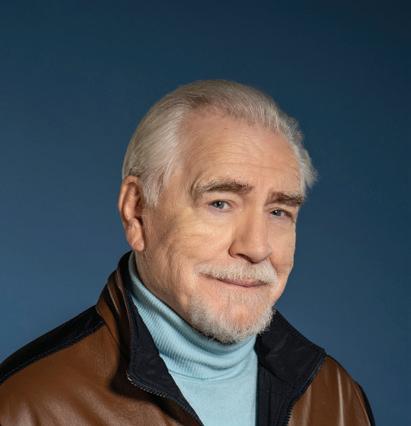
That is the core to Brian Cox, and holds true whether he is playing a tragic Shakespearian character, a wry comical sitcom role, or a foul-mouthed press baron. In his inaugural visit to Kellogg he sat alongside Professor Jonathan Michie and Dr Clare Morgan in an ‘In conversation’ to share his thoughts with a full house packed into the Hub.
He talked through some significant moments in his career, reflected upon how he came to be the lauded actor he is, and shared his opinions on –and anecdotes about – people he has worked with through the years.
His focus on the written word was paramount as he explained in response to Dr Morgan who leads the College’s Centre for Creative Writing. ‘The writer-actor relationship is based on trust’, he said, distancing himself a little from those actors who would insist on having input. ‘If you have good writers, they know what they are doing. It’s not for
the actor to fill in gaps they think are there. You don’t tell Anton Chekov how to write. The great writers do it for you.’
But that is not to say that actors are merely blank canvasses. ‘Imagination trumps emotional memory,’ he asserted, as the conversation turned to the ‘method’ school of acting. Exploring the text was part and parcel of exploring yourself. ‘You have to think with a text,’ he said, ‘Drama school taught me to think.’
Indeed, he agreed that being an actor, with little in the way of an age barrier, is almost the very definition of lifelong learning – so fundamental to the Kellogg ethos. ‘Acting is about holding the mirror up to nature. In the end, you fall back on yourself and your experience. It opens up your understanding of yourself and helps you learn to trust yourself.’
Members of Kellogg are indeed fortunate to be able to count amongst their number someone who has over 50 years in the acting and writing business, and a vast catalogue of experience to draw upon from what he calls ‘The Human Journey’.
What was your background before coming to Kellogg?
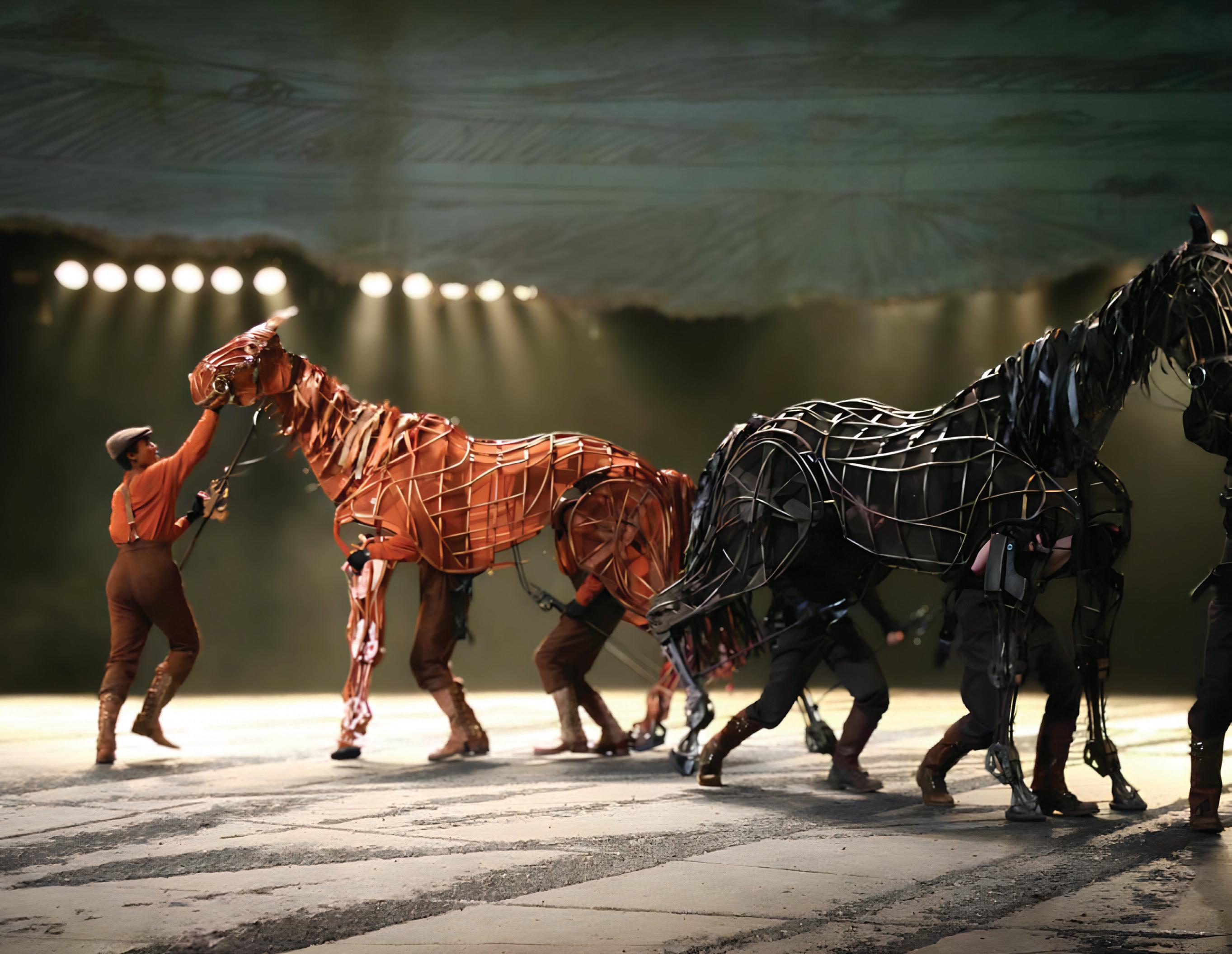
I grew up immersed in the performing arts, theatre in particular. My mother worked at a children’s theatre, where I spent most of my childhood playing pretend and slaying dragons made out of cardboard. Fast-forward to graduating from drama school and I landed my first audition (beginner’s luck!), and before you know it I was performing 8 times a week on Broadway in the North American premiere of National Theatre’s War Horse

It was a memorable time in my life for many reasons. For the two years I performed with War Horse, I grew as an artist in countless ways, in addition to learning puppetry on an intimate level from world-class puppet masters.
What do you enjoy most about working for Kellogg?
Definitely meeting our amazing alumni. As you can tell from my background, I’m a people person. I love getting to hear alumni’s stories about their post-Kellogg journeys, as well as the memorable experiences they had while studying here. It’s clear that Kellogg has had a profound impact on many people over the years and I always look forward to learning the ways that it has helped shape people’s lives.
Alex joined the US cast of the National Theatre’s multiple Tony-winning War Horse straight from drama school
You originally come from the US. How did you end up at Kellogg?
It’s a long story, but I’ll make it short! Essentially, I moved to Oxford from the US a few years ago to be with my wife while she was reading for her DPhil in Law. I quickly became charmed by the town, like everyone else, and upon completion of her studies we made the easy decision to stay. It was during this time I came across this great opportunity to be a part of a special team at a unique time in the life of Kellogg College.
Being a part of that production was a life-changing experience, to say the least. I was cast to be on the team of puppeteers that brought to life the magnificent life-size horse puppets, designed and built by South Africa’s Handspring Puppet Company. The play was a critical success and went on to win 5 Tony Awards, including Best Play.
After Broadway, I continued performing around the US in regional productions of plays and musicals. I ended up in Los Angeles for a few years working behind and in front of the camera. It was during that time I played the lead in a short film that won a Student Academy Award.
I’m also inspired by the growing amount of support coming in from alumni and friends for the 1990 Club, Kellogg College’s regular giving programme. I look forward to steering this programme to greater heights to be able to help enhance the College experience for all our students for years to come.

What are some of the things alumni have to look forward to this year?
Tell us something about you that we don’t already know.
We have some exciting events already lined up for alumni this calendar year. The Kellogg College Ball is back this summer and tickets have been set aside to ensure alumni can attend. I can’t share details yet, but our Meeting Minds speaker line-up is going to be star-studded, as they say in ‘the biz’. We’re turning the Hub into a swanky, jazzy nightclub for the Diana Wood concert. And more!
I love to row! As one does, after moving to Oxford I would often see rowers out on the water in the cold early hours and think, ‘never me’. But once I finally gave it a shot, I was hooked. Now I love a good frosty morning outing on the Isis before coming in to start my day at Kellogg.
“The play was a critical success and went on to win 5 Tonys, including Best Play.”
— Alex Hoeffler
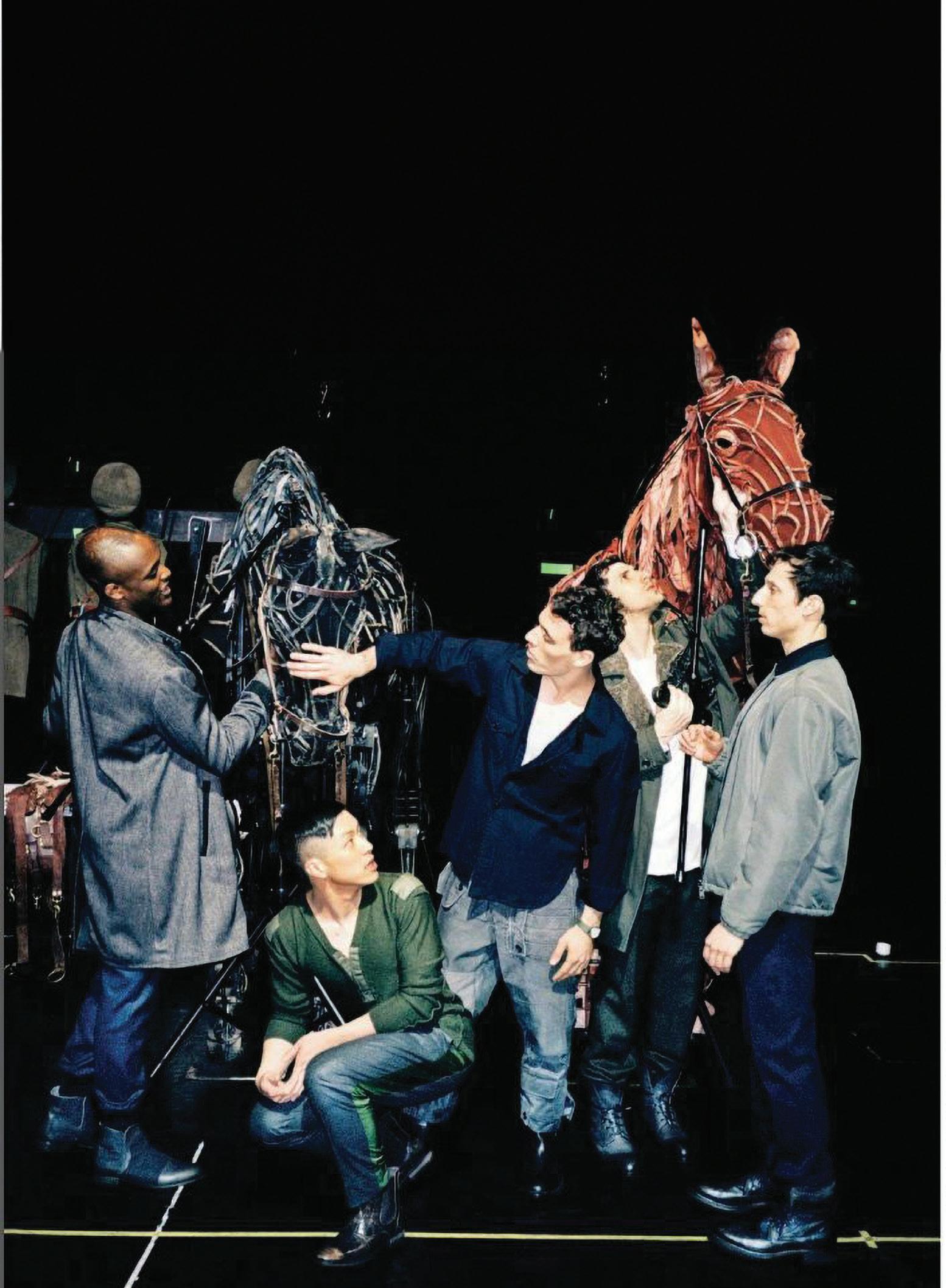


TJulie Summers joined Kellogg in Michaelmas term 2023 as the college’s first Writer in Residence, funded by the Royal Literary Fund (RLF).
he RLF Fellows are funded by the sale of the merchandising rights to Winnie-thePooh which A A Milne left to the Royal Literary Fund in his will in 1956. This realised a sum greater than the fund needed for its principal charitable aim, which is to support writers in trouble. In 1999 the board of trustees proposed supporting writers by inviting them to spend two days a week in universities to help others with writing skills.
Julie’s role as our Writer in Residence has been as a port of call for any member of
College wishing to discuss any aspect of writing. And as she explains, it can cover a wide variety of styles:
‘I am as happy helping to shape a personal statement as thrashing out a difficult chapter in a DPhil. Good, clear writing leads to good, clear communication. Everyone at college has to write, whether essays, research funding applications or academic proposals. Some find writing easy, others do anything to avoid the moment when they have to sit down and tap out that first word. I’d like to think I can make a difference to the latter by helping to bring writing to heel and making it enjoyable.’
Kellogg’s emphasis on lifelong learning is something close to Julie’s own heart. Having spent twenty years working in the art world she came relatively late to writing for a living and learned a lot the hard way.
Meeting members of the college who come to her for advice is the best part of the role in Julie’s opinion. ‘Nothing gives me more pleasure than seeing an anxious visitor smile when they realise that I can help them to feel better about their writing. Great writing, whether academic, for jobs, publication or just sheer pleasure, is about communication and storytelling.’
“Great writing, whether academic, for jobs, publication or just sheer pleasure, is about communication and storytelling.”
— Julie Summers
Kellogg Fellow and social historian Dr Jonathan Healey appeared at the Oxford Literary Festival in 2023 talking about his book The Blazing World: A New History of Revolutionary England , which examines 17th century events and explores parallels with today’s political landscape.
From a monarchy-centric beginning, we witness the shift to a parliamentary system, flourishing arts, and the inception of a nascent welfare state by the 18th century. Dr Healey narrates this transformation through the lives of both notable figures and ordinary citizens, illustrating how past constitutional shifts and ideological clashes mirror presentday challenges.
Dr Healey’s book received enthusiastic reviews on publication. The Times described it as ‘a wonderful book, exhaustively researched, vigorously argued and teeming with the furious joy of seventeenth-century life’ with the Telegraph calling it ‘A brilliant, bloody account of England’s most dramatic century.’
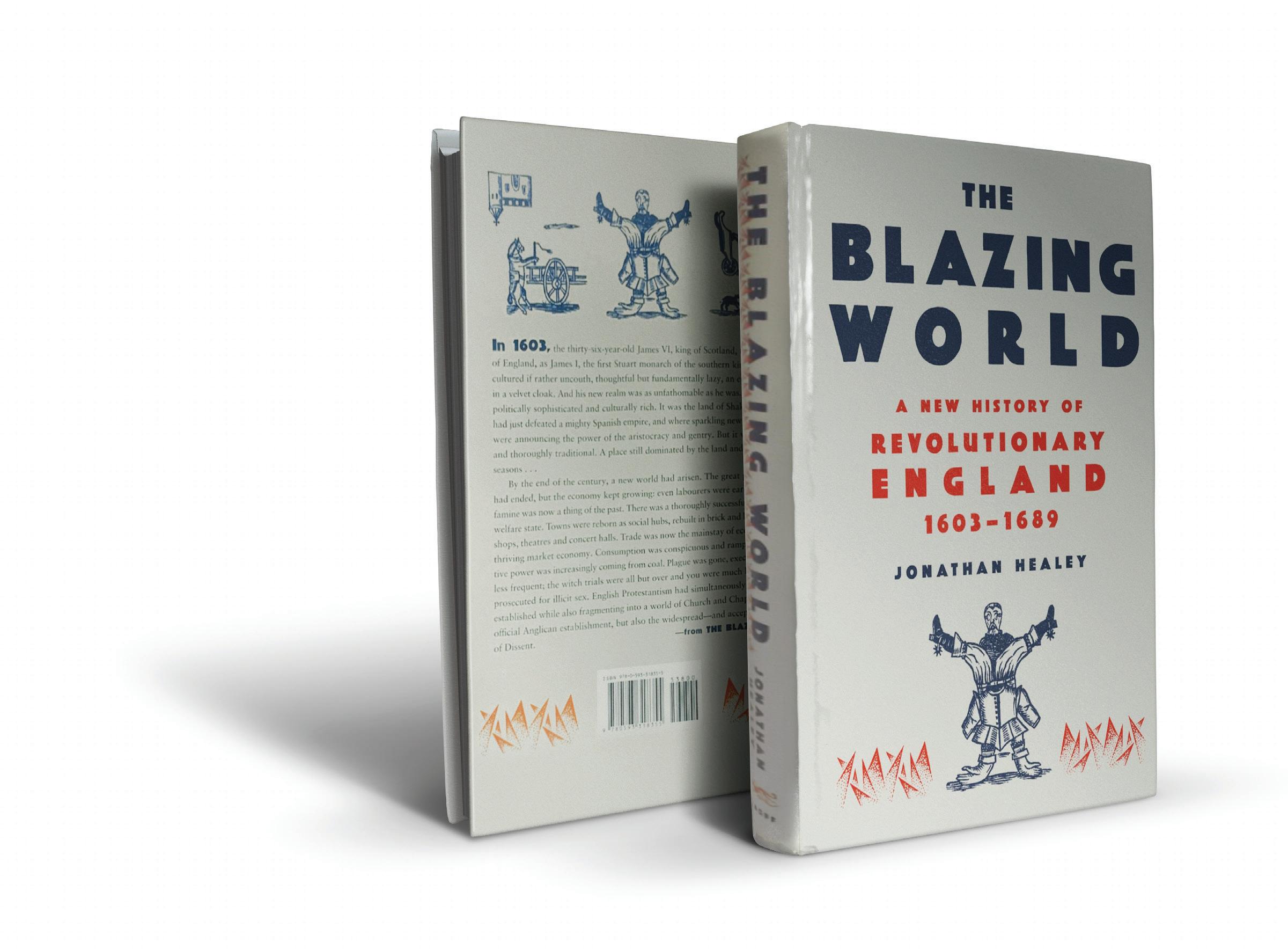

July 2023 saw the publication of the latest book by Kellogg Fellow Dr Leah Clark. Courtly Mediators: Transcultural Objects between Renaissance Italy and the Islamic World which delves into the intricate exchange of diverse materials – metalware, ceramic drug jars, Chinese porcelain, and aromatics – across the early modern Italian, Mamluk, and Ottoman courts. This groundbreaking work shifts the narrative, positioning Aragonese Naples as the epicenter of an international courtly culture, fostering cosmopolitanism and transcultural exchanges. Dr Clark highlights the active role of artists, ambassadors, and luxury goods in this vibrant milieu. By elucidating the dynamics of how transcultural objects were traded, showcased, replicated, and contextualised, she introduces a transformative methodological framework, reshaping our comprehension of the Italian Renaissance court. Clark’s volume offers a multi-sensorial perspective, redefining the understanding of Italian Renaissance art as a product of interactions with global material cultures beyond European roots.
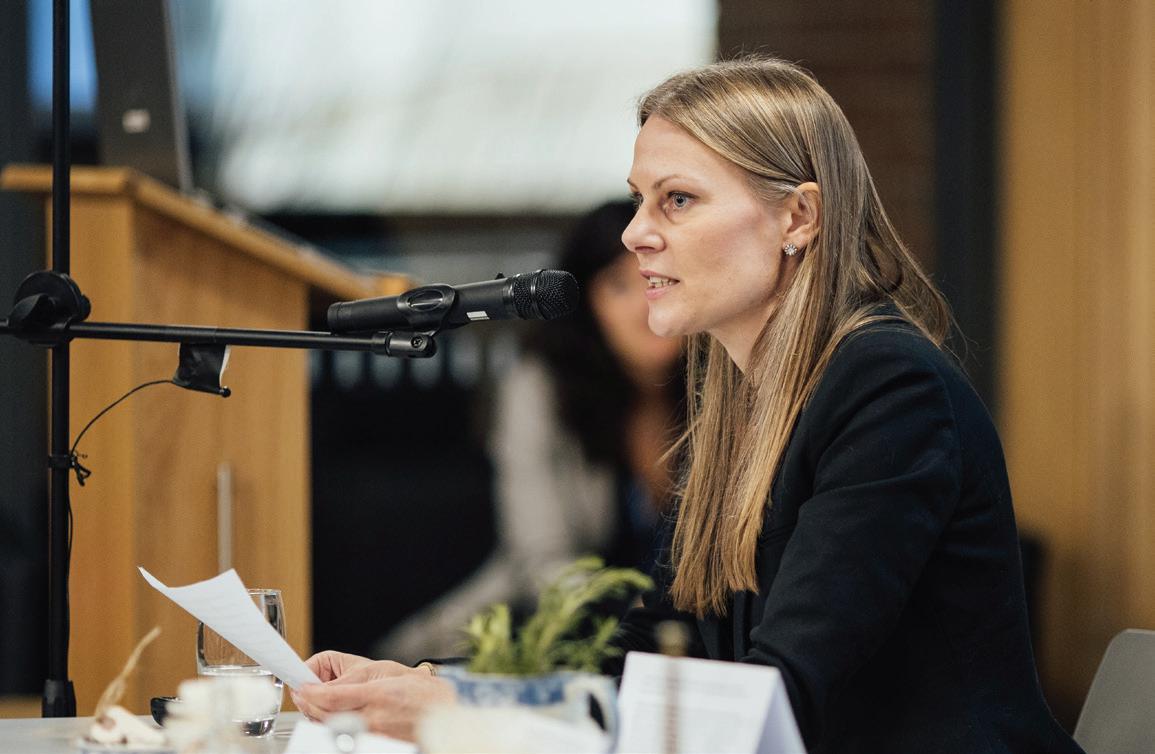

Ki-Moon: Leadership, values, and global achievements continued.

pivotal role in the 2015 Paris Agreement which marked a historic moment in the fight against climate change, as nations committed to limiting global temperature increases and transitioning to a low-carbon future. Ban Ki-moon championed the empowerment of women and gender equality, with the “HeForShe” campaign urging men to become active allies in the fight for women’s rights. Ban recognised that achieving sustainable development and peace required the full participation of all members of society.
Ban’s diplomatic skills were put to the test in navigating complex geopolitical challenges. Ban consistently called for peaceful resolutions to conflicts, emphasising dialogue and international cooperation as the preferred paths to stability. While challenges persisted, his dedication to diplomatic solutions underscored his commitment to the principles enshrined in the UN Charter.
Ban Ki-moon’s diplomatic achievements were not limited to addressing crises; he also played a crucial role in fostering dialogue among nations. His efforts to facilitate the reopening of diplomatic relations between Cuba and the United States in 2014 marked a historic breakthrough, ending decades of estrangement between the two nations. The significant achievements of Ban Ki-moon through his leadership of the UN, his unwavering commitment to its principles, and his dedication to fostering global cooperation for a more sustainable and just world place him in the highest esteem, and the college is delighted to bestow the Bynum Tudor Fellowship upon him.
Accepting the Fellowship, Ban Ki-moon remarked: ‘I’m delighted to have been honoured by an Oxford college that shares my passions for social and environmental sustainability, tackling climate change, and promoting international human rights.’
MATRICULATED 2008
MSc Software Engineering
In 2023 I became the Digital Media & Peace Innovation Fellow, at the UN-mandated University for Peace, as Academic Coordinator of the Global Center for Peace Innovation, before joining the Council on Foreign Relations (CFR) as Inaugural Higher Education Ambassador.
“The world is over-armed and peace is
under-funded.”
— Ban Ki-moon
The Ebola epidemic in West Africa in 2014 presented a formidable challenge during Ban Ki-moon’s tenure. Recognising the urgency of the situation, he mobilised the international community to provide support and resources to affected countries. His swift response demonstrated a commitment to global health security and reinforced the UN’s role as a coordinating force in times of crisis.
Michael Dawson
MATRICULATED 2004
DPhil Archaeology
In 2022, following the Russian invasion of Ukraine I bridged professional practice and research. The resulting book, War and the Historic Environment, published in Spring 2024, scrutinises Russian propaganda and the removal of Sovietera monuments, and challenges the ‘vranyo’ phenomenon. Moving from mosaic pavements to war, the book highlights the enduring principles of evidence-based research I cultivated at Kellogg.

MATRICULATED 2009
MSc Water Science, Policy & Management
Since matriculation I have built Watermarq, a for-purpose company that uses technology and local stakeholder engagement to assess water risk. The business has got momentum; raising money, signing customers and building something that we are proud of.

MATRICULATED 2010
MSc Software Engineering
I am a prime example of the lifelong learning ethos of Kellogg College. Since my MSc in Software Engineering I have recently become interested in the world of human-computer interaction. I have found a new passion: bridging software engineering with human psychology and design, and thus I entered the world of User Experience/User Centred design, and Usability engineering.
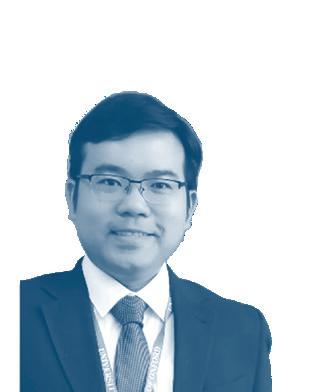
MATRICULATED 2009
MSc Global Health Science
I was appointed to the Oxford University Alumni Board as a Board Member with effect from September 2023. I am proud to be able to help increase the presence and representation of Kellogg and postgraduate students on the Board.
MATRICULATED 2010
DPhil English Local History
I have been immersed in historical research as a natural extension of my time at Kellogg; the unpublished diary of a Herald of the Regency period, around which I built my MSc and DPhil work, has continued to provide me with rich material for research. In 2022/23, I rashly committed myself to acting as editor for a history of a livery company of which I am honorary archivist, the Worshipful Company of Masons of London.
MATRICULATED 2014
MSc Creative Writing
After completing my MSc and leaving Kellogg and Oxford, I went into writing video games. I worked on the story and design for Assassin’s Creed Odyssey, Assassin’s Creed Valhalla, Immortals Fenyx Rising, Dying Light 2, and Disciples: Liberation. I was recently promoted to the position of Narrative Director with Sumo Digital (Sheffield) and have several AAA projects forthcoming.
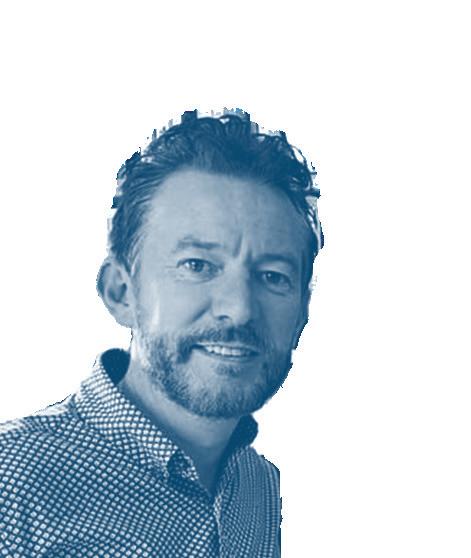
MATRICULATED 2014
MSt Creative Writing
I am on a book tour of the US promoting my debut poetry collection Photofit (Pindrop Press, 2023). My work has been in literary magazines such as Agenda, Acumen, The Moth, LIT Magazine, Naugatuck River Review, Presence, The Penn Review, and Artillery Magazine. I am the author of four criticallyacclaimed nonfiction titles on Shakespeare.
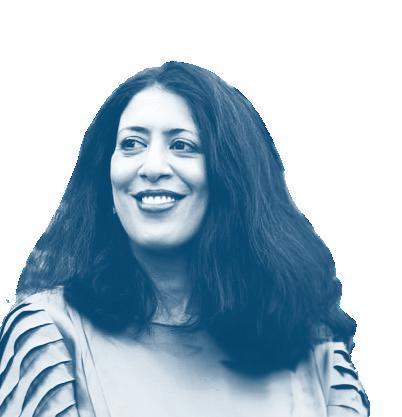
MATRICULATED 2015
MSc Major Programme Management
I was awarded an OBE for services to International Development, Humanitarian Action, and Community Cohesion. I have designed and led large-scale, transformational social sector programmes in governance, education, innovation, and social protection across Pakistan, Nigeria, Kenya, Lebanon, Jordan, Myanmar, and Tajikistan.
MATRICULATED 2016
DPhil Clinical Medicine
I recently won an emerging leaders award from the Royal Society of Tropical Medicine and Hygiene. I undertook DPhil field work on community engagement around mass anti-malarial administration with a community randomised trial in Laos, and was based at Mahidol-Oxford Tropical Medicine Research Unit (MORU) in Thailand, one of the overseas units of Nuffield Department of Medicine. I continue to work around the social science aspects of malaria, infectious diseases, community engagement, and broader public health issues based at MORU.

MATRICULATED 2014
MSc Applied Linguistics & 2nd Language
I was recently awarded Woman of the Decade at the Women’s Economic Forum, London – an award I dedicate to all women; having championed (Arab) women in business for over 15 years, it was a huge honour.

MATRICULATED 2015
MSc Cognitive Behavioural Therapy
I have been building on my academic achievement at Kellogg to make a real impact in the world of mental health. In 2020, after completing my thesis on Cognitive Behavioural Therapy (CBT), I embarked on an ambitious project at Istanbul Medeniyet University. There, I established a child and adolescent psychiatry training clinic that now nurtures the skills and knowledge of 26 aspiring psychiatrists. This initiative has contributed significantly to the mental health field in our region.
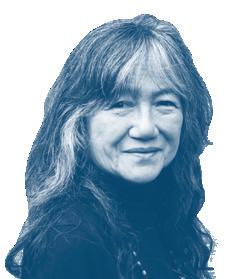
MATRICULATED 2017
MSc English Local History
I was the 2023 featured speaker and inaugural international honouree at the Catalyst luncheon honouring the achievements of women in the male-centric drinks world. As a drinks historian and director of Mixellany Limited from Wiltshire, UK
I write, study, and catalogue the history of the drinks industry and supported the revival of English gin. As a person of colour, I am pushing for greater change in the industry.
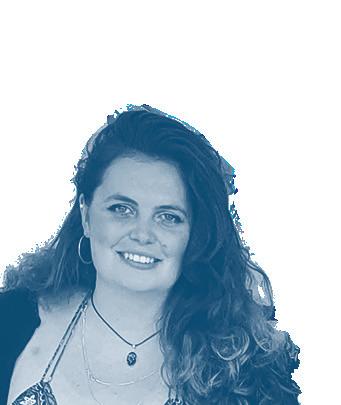
MATRICULATED 2017
MSt History of Art & Visual Culture
I run my own Vintage Clothing and Accessories business. Aurora the Hoarder sells unusual handpicked genuine vintage that I has collected since I was 13 years old from all over Europe, driven by my love of all things 1970s. All items are made from the highest-quality fabrics and are offered in a range of sizes (including hard to find plus sizes) for both men and women.
MATRICULATED 2017
MSc Software Engineering
I have written a book with O’Reilly called Unifying Business, Data, and Code: Designing Data Products with JSON Schema It is already fully available as an Early Release and is scheduled
MATRICULATED 2018
MSc Learning & Teaching
I am Head of Economics and Business, and National Education Union (NEU) workplace representative at Cheney School, Oxford. Since matriculation, a highlight for me has been a 2023 visit to Cuba as part of the NEU’s international delegation. I wrote about the experience in The Morning Star on 6 November 2023.

MATRICULATED 2018
MSc Educational Assessment
SurveyMind, an AI start-up I founded in 2022 with co-founder Alex Sunley, has grown massively. It is now one of the leading providers in the new field of AI-native transcription and analysis software for market, medical, and educational research agencies. SurveyMind has worked with firms across the UK, USA, and EU, and has landed contracts with big names including the likes of UCLA and many other leading institutions.

MATRICULATED 2020
MSc Contemporary Chinese Studies
I have turned my academic focus from elite politics onto the grassroots level for my PhD (History, University of York). My master’s thesis was on the 1980s UK-China negotiations on the question of Hong Kong. I developed this into two separate peer-reviewed publications: one is a historical account exploring how Prime Minister Margaret Thatcher’s agency and civil service bureaucracy shaped the UK’s policy; the other was a social sciences analysis of tactics used by Chinese negotiators.
to go to print in March 2024. I was awarded two CAR Hoare prizes by the University of Oxford for the best project and best academic work during 2022. To help power my work on JSON BinPack and related fundamental technologies in the data space, I created Sourcemeta a London-based open-source research lab fuelling the innovations I am working on.
MATRICULATED 2018
MSc in Evidence-Based Health Care
I completed the MSc in Evidence-Based Health Care (Medical Statistics) in 2021. That programme was extremely valuable for my professional development. It was a sabbatical year for me as an academic pathologist, but spread over a longer period of time. I will be serving a one-year term as President of the Association for Diagnostics and Laboratory Medicine (formerly the American Association for Clinical Chemistry), beginning summer 2024.

Brandon Ortiz Casas
MATRICULATED 2019
MSc Nanotechnology for Medicine and Health Care
I founded a new business focused on clinical and molecular diagnostics for children. This venture embraces both technological innovation and the patient’s experiences. The company has improved the sample collection process to make it the least invasive and traumatic as possible. I also work in academia and as a teacher, advocating for the democratisation of diagnostics. Due to these efforts, I have been recognised by the City of Iguala as a distinguished citizen.

MATRICULATED 2021
MSt History of Design
In October 2023 I was appointed to the Editorial Board of the Journal of Design History as the Social Media Editor. I have led the creation of branding documentation for the journal’s social media presence and am working with the Editorial Board to grow our readership and increase awareness of publication opportunities among scholars in design history and adjacent fields.

The time spent at Kellogg provided experiences
Rudra has carried with him. He took delight in sharing opinions and perspectives with his fellow students, and learning from their experiences. And Rudra has retained that close College contact, not least by inviting the College President to visit India. ‘It was a privilege to have Professor Michie visit us in Kolkata and share his expertise in enterprise and his belief in lifelong learning with our local business community and trade bodies. I know his visit was much appreciated.’
“A good product is sustainable. It should be wanted. It should have longevity. The makers should be rewarded for their talents and skills.”
— Rudra Chatterjee
we are looking at climate change, societal change, or economic change, we need to be able to adapt to respond.’
Rudra himself sees lifelong learning as an important part of responding to global change. ‘We need to be able to unlearn and relearn,’ he says. ‘Whether and integrity be maintained? He has no doubt: ‘A good product is sustainable. It should be wanted. It should have longevity. The makers should be rewarded for their talents and skills.
In this changing world, with a greater emphases on sustainability and social justice in the workplace, how can his companies’ commitment to high quality
If we pay attention to that, our products will be in demand and the business will thrive.’
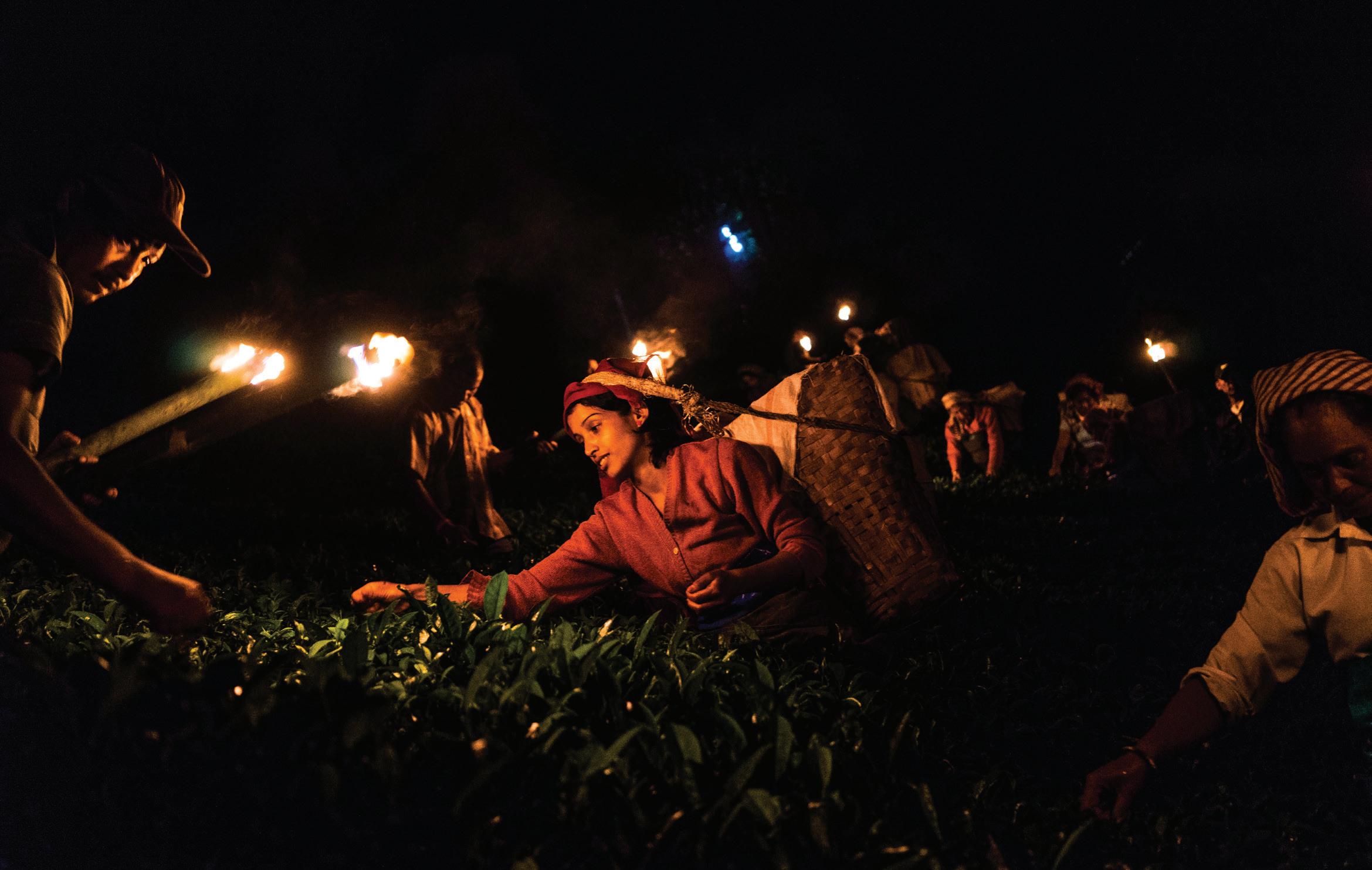

Seung Chong read for his MSc in Taxation at Kellogg. His time with us proved to be an impetus for further achievements across a wide range of academic and professional interests.
‘Engaging in intellectual pursuits beyond the realm of professional obligations holds a significant place in my belief system,’ says Seung Chong with a degree of understatement.
‘A few years back, I authored The Law and Practice of Mergers & Acquisitions in The People’s Republic of China which was published by Oxford University Press. The allure of reading for the MSc in Taxation lay in its proximity to law while offering a distinctive dimension, blending legal aspects with a robust foundation in redistributive justice.’
Seung Chong’s time at Kellogg as a parttime student is fondly remembered: ‘My mornings often commenced with a run in the Parks followed by breakfast at The Hub. The Dining Hall had delectable vegetarian lunches, and I greatly enjoyed the cheeseboard.’
Always multi-tasking, Seung has, in tandem with his law practice (offering intricate corporate and commercial law advice), been transitioning into an arbitrator role, focusing on building a profile in the field. Simultaneously, he continues his educational journey through a PhD at Maastricht University, concentrating on arbitrating tax disputes involving sovereign states.
His time at Oxford was instrumental in equipping him to operate in so many fields. ‘It elevated my cognitive abilities, allowing me to read, think, and analyse at an accelerated pace. It’s akin to a mental oil change. I recall shortly
after submitting a 3,000-word essay, I took the exam for membership of The Chartered Institute of Arbitrators, passing with a remarkable 94%, a feat attributed to my recent degree.’
Professionally, in line with his background, Seung aspires to be a full-time arbitrator in areas like corporate and commercial law, China-related investments, international law, and international tax. Aligning with the ethos of redistributive justice, he also aims to offer non-profit advisory services to trade associations, NGOs, and non-profits from developing and low-income states.
With such a varied and developed range of talents, he must have advice to offer the current generation of students? Not so. ‘I refrain from offering advice’, he says, ‘but I pose a question: What defines a Kellogg person? While we defy categorisation, our shared values of lifelong learning, the ability to balance education with work and family responsibilities, and an appreciation for second or third chances in life undoubtedly set us apart as a distinctive community.’
“I refrain from offering advice – but I pose a question: What defines a Kellogg person?”
—Seung Chong
Seung’s personal interests are wideranging: ‘I’m undertaking the ambitious task of writing a quadriptych biography’ he declares, ‘It spans the lives of Churchill, Leo Amery, Alexander of Tunis, and Nehru, threading common narratives through their stories.’
Reflecting his fondness for the college, Seung has been active in building an alumni group in Hong Kong, and looks forward to welcoming Professor Jonathan Michie for a visit in the not too distant future. Having reveled in his time at Kellogg, Seung Chong is becoming one of College’s great champions globally.
Ottilie Klein’s time as a member of Kellogg College was a brief phase in a long continuing educational journey. She initially read American Studies, Modern History, and Political Science at the University of Bonn and also studied English at Mount Holyoke College.
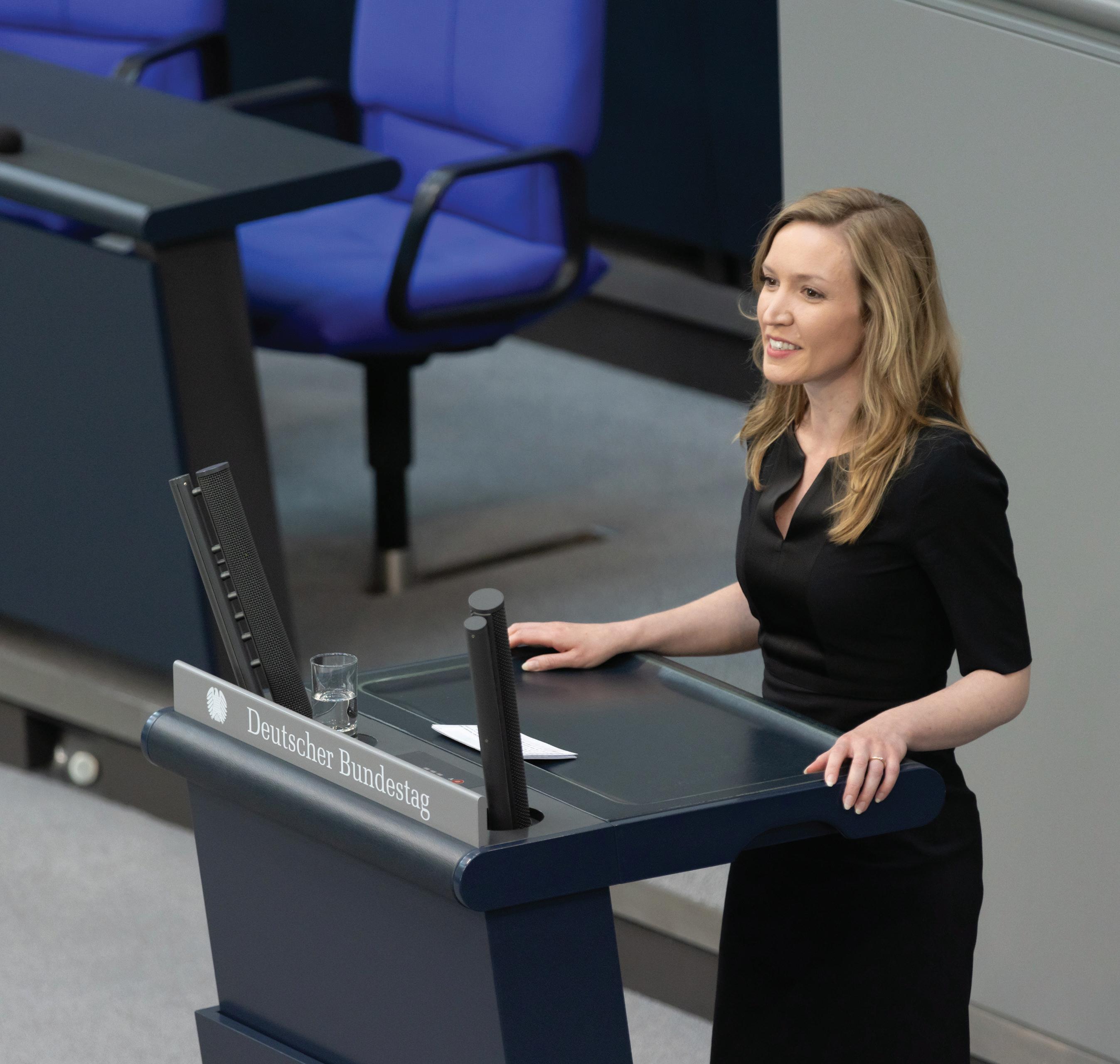
She then won a Jenkins Memorial Scholarship, which allowed her to study at Oxford and widen her expertise in drama studies (her time at Kellogg), before successfully completing a binational doctorate at the University of Gießen and the University of Helsinki. This thesis she turned into a 346-page volume titled Lethal Performances: Women Who Kill in Modern American Drama, which won a prize.
At that time, she never would have thought to one day get elected to the Deutscher Bundestag.
Twice, that is.
Ottilie’s busy journey is perhaps a prime example of lifelong learning, so central to the values of Kellogg. ‘I guess that’s true,’ she acknowledges. ‘I didn’t set out to be a politician, though I always had political interests. I came from a working class background and always felt the need to get a ‘proper job’ before going out on a limb.’
Ottilie’s journey within the Christian Democratic Union in Berlin is a testament to her resilience and dedication to public service. She was raised with strong values of community and hard work, and academic prowess led her to focus on international relations, where her passion for public policy and diplomacy blossomed.
Though she has worked across different sectors – finance for example – Ottilie embarked on a career in public service, working as a policy advisor for governmental agencies. Eventually she decided
to become a party member, and chose the Christian Democratic Union as the right home for her opinions. She rapidly made an impact and was propelled into the political arena as her talents and commitment came to the fore.
Her elevation within the party has been characterised by a pragmatic leadership style and an ability to bridge divides through consensus-building. Today, she is Secretary General of the Christian Democrats in Berlin and as such stands as a prominent figure within the party, advocating for policies that promote economic prosperity and social inclusion.
She relishes the experience she has had travelling internationally during her academic career and recalls her time at Kellogg as a thoroughly enjoyable time.
I was an active participant in the MCR, as Events Officer. Most of all I recall how wonderful it was to meet people of different nationalities and experiences, to talk together across cultures and academic disciplines.’
Then in keeping with her global outlook she enthuses ‘The world meets in Oxford. I think it’s the most international place on earth!’
She goes on, ‘I’ve profited greatly from living in different contexts, from meeting people of different backgrounds, and from working across different industries. This experience has also shaped my political perspective. After all, I haven’t had a privileged upbringing, nor have I entered the world of electoral politics without first having experienced life outside that sphere.’
“The world meets in Oxford. I think it’s the most international place on earth!”
— Ottilie Klein
This internationalism and commitment to social welfare are reflected in Ottilie’s current committee memberships in the Bundestag: the Labour and Social Affairs Committee, and the European Affairs Committee. In the case of the latter she shares her dismay at the Brexit fallout and what it means for the opportunities she had. ‘It is definitely having an impact. The rise in tuition fees puts off German students, and internships become difficult because of the residency requirements. It is so disappointing, when academia is built on cooperation across borders, that it should be made more difficult.’
She carries with her one further aspect of her time at Kellogg that informs her political awareness. ‘When researching the mechanics of drama and performance, I spent a lot of time studying narratives, messages, and language. That is the currency of politics. I think that is an important thing for young people to appreciate and be alert to. We need to ensure that everybody can learn to see past the fake news and disinformation and is equipped to analyse and evaluate. It’s a matter of lifelong learning, so to speak.’


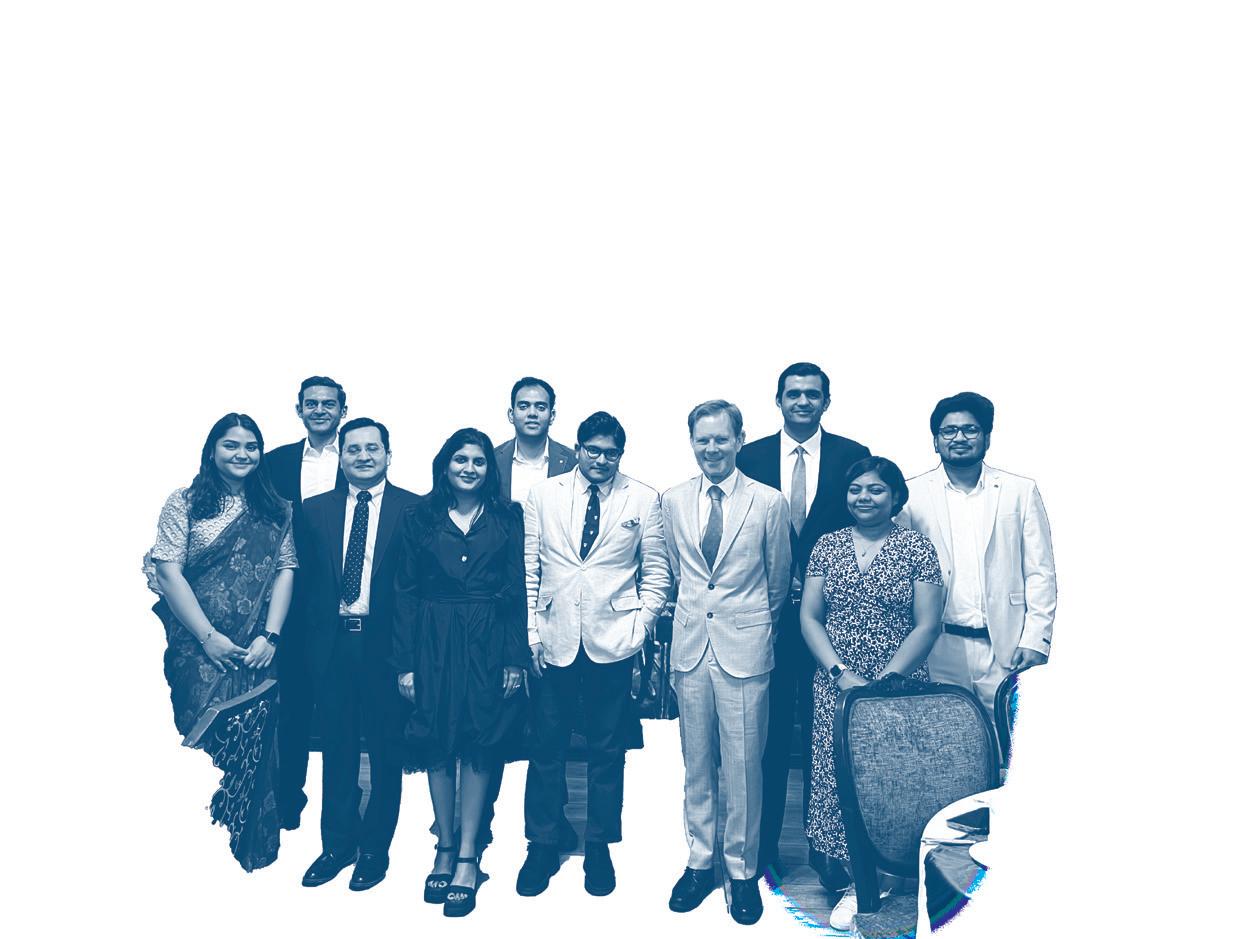


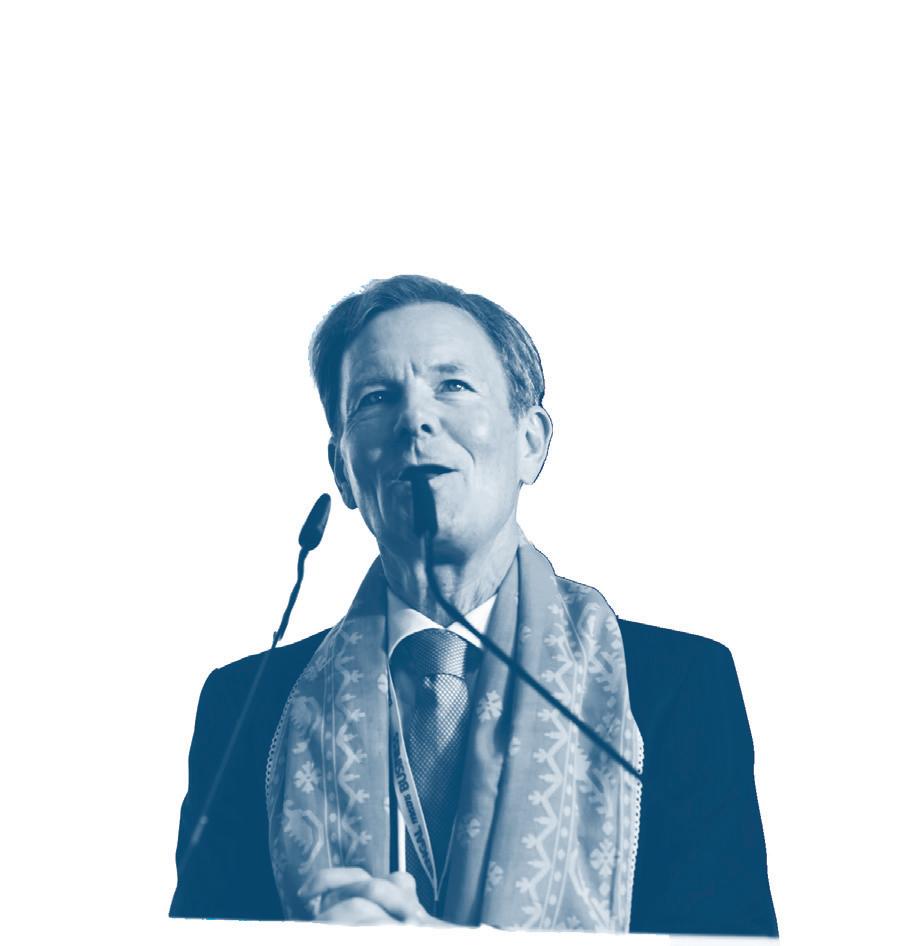
Professor Jonathan Michie visited India in 2023, invited by Kellogg alumni. It was a rewarding trip on so many fronts as he enthusiastically shares with us.
was invited to Kolkata by our Indian alumni. I’m glad I accepted. My November 2023 visit included an amazing alumni reunion event; an invitation to address the opening plenary of the Bengal Business Summit, and to speak on education the following day; a private meeting with the Chief Minister for the region, with a population of 100 million; addressing a specially convened dinner of leading figures from the Kolkata business and civic community who wanted to hear about Kellogg’s development plans –and much more!
The alumni reunion event was hosted by the Bengal Club, organised by Dr Urvi Khaitan who curates our exhibition on the history of women of colour amongst Oxford’s degree students each year for Black History Month. Urvi has since been appointed to a prestigious three-year fellowship at Harvard – but will continue to add to her annual exhibition at Kellogg!
The Bengal Business Summit brings together thousands of investors and policymakers from across the world each year; it was an honour to speak not only at the session on education, but also to the opening plenary. West Bengal is the only region in India led by a woman, and at the opening plenary
of the Bengal Business Summit the First Minister, Mamata Banerjee described her region as being committed to democracy, inclusion, and women’s emancipation. In a private meeting with the Chief Minister, I reported on the strong links our college has with India in terms of students and the key role they have often played in leading our Middle Common Room. I expressed the hope she might visit; she said she would be delighted.
Alumnus Rudra Chatterjee hosted a gathering of leading figures from Kolkata’s business and civic community, whom Rudra believed would be supportive of our college’s mission and vision. Both Rudra and I spoke, and we received a warm reception from those present, many of whom are now engaged with our Development team led by alumna Sharika Khan.
Kolkata is an amazing place. One highlight was visiting the memorial to Queen Victoria, a massive palace built from marble which far outdoes anything of the sort in Britain – particularly stunning given how far the marble had to be transported, and that Queen Victoria had never visited India. I have no doubt that our November 2023 visit will be the start of a beautiful friendship between our college and Kolkata.

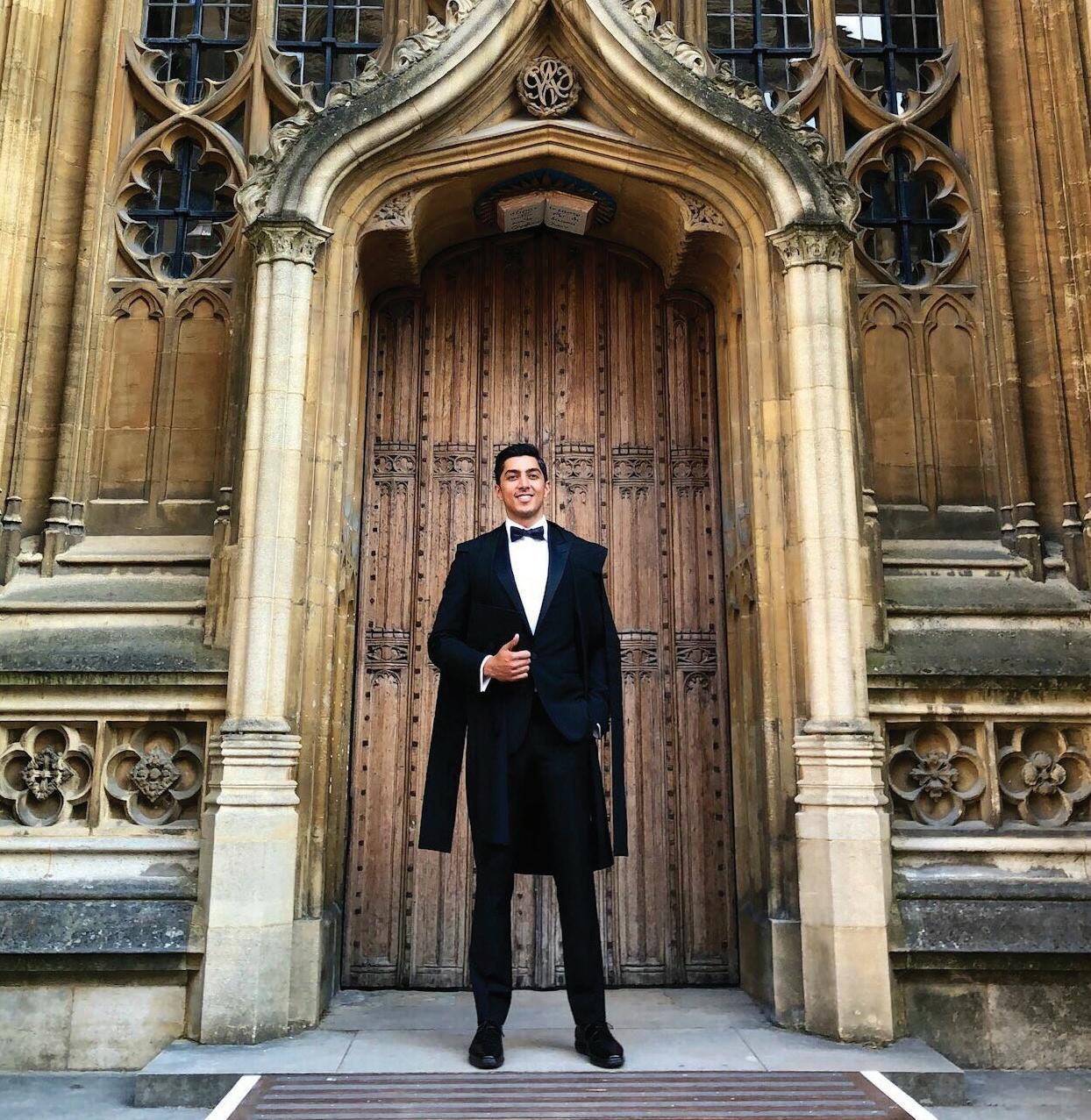
Giving back to Kellogg so others can give back too
The Tareen Oxford Scholarship is made possible by the generous support of Ali Tareen, a member of Kellogg during his EMBA which he obtained in 2017. He has made a contribution of £250,000 to establish the scholarship.
’Impoverished areas like South Punjab need bright, young leaders to bring change to the region,’ attests Ali, ‘and that is the reason I have started the Tareen Oxford Scholarship. While applying, every applicant will be asked to mention how they plan on giving back to the region.’
To encourage talented students from South Punjab to apply and benefit from the Tareen Oxford Scholarship, the OPP, in partnership with Ali Tareen, organises bespoke access programmes for South Punjab.
Thanks to the generosity of a Kellogg alumnus, would-be students can now apply for a scholarship to help them fulfil their ambitions. The Tareen Oxford Scholarship, will provide means-tested funding for Pakistani students, with a preference for talented students from South Punjab, who have an offer from the University of Oxford to study on one of the graduate courses offered at Kellogg. This scholarship is in partnership with the Oxford Pakistan Programme (OPP).
The philanthropy of alumni and others is an essential source of funding that allows students of diverse economic and cultural backgrounds to matriculate
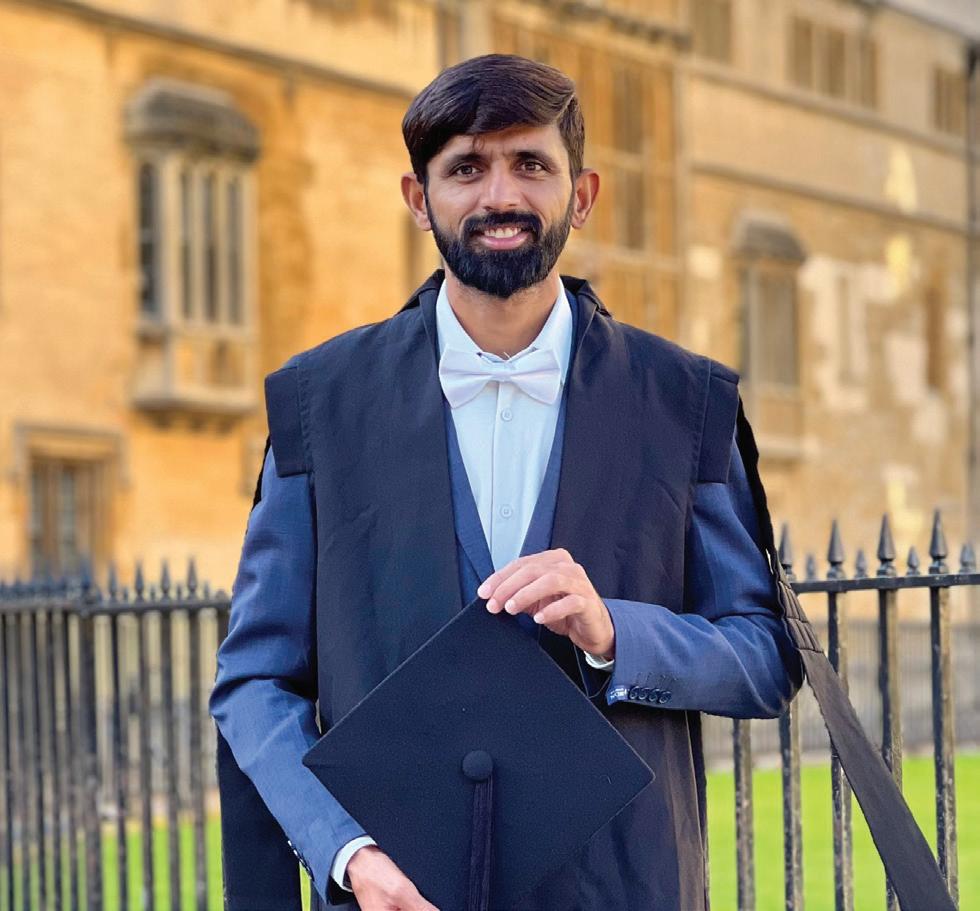
Ali is proud of his association with Kellogg College, and delighted to be able to invest in his country’s future in this way. He considers himself incredibly lucky and privileged to have been able to do his master’s at Saïd as a Kellogg student. He found it an unforgettable experience, and one that he would like more people to share in.
Ali’s high regard for the college shines through in the pleasure he takes in the University’s acceptance of the scholarship funding. ‘I am grateful to the wonderful Oxford Pakistan Programme (OPP), and my alma mater, Kellogg, for being so receptive and helpful throughout the process. Kellogg is one of Oxford’s most progressive colleges. It is an honour to be its ambassador.’
Jabir Ali hails from Kundal Khokhran, which he describes as a “marginalised” district in Jhang, Pakistan. It is a village where approximately half of the population works in low-income, labour-based vocations to earn meagre incomes for their families.
discourage the children of these employees to seek education, while prioritising the education of their own children in elite schools. Most of the people in Jabir’s village, due to financial hardships and difficulties, send their children to work, rather than encouraging them to study.
Local landowners, who employ most of these labourers, often
Continues on next page.

Coming from Eritrea, Sara’s journey to becoming the founder of Ambessa Play was shaped by her personal experiences, a deep-rooted commitment to addressing the digital divide, and a passion for empowering children through hands-on learning.
Sara Berkai was born in Khartoum, Sudan, her parents having fled there from the war in Eritrea. Sara was born after Eritrean independence, but her parents eventually sought refuge in London. Her trajectory into the tech industry and education began with a combination of academic pursuits and volunteer work. Sara’s exploration of these sectors led her to a pivotal moment – a return to Eritrea to deliver STEM workshops, an experience that would catalyse the birth of Ambessa Play. ‘I feel a strong connection with Eritrea,’ she explains. ‘I still have a large number of family connections there and try to visit regularly. I am particularly close to my grandmother who is there, and I can count 52 first cousins though the majority of them have left the country.’
Inspired by the enthusiasm of young minds building laptops, and driven by a commitment to equal access to education, she founded the company – she describes it as “Think IKEA for education” – which aims to bring textbooks to life and make learning a playful experience.
A pivotal aspect of Ambessa Play’s mission is the one-for-one model. Sara has extended her market so that she is making institutional and corporate sales as well as to individuals. For every educational kit or workshop sold, the company donates a similar kit or
workshop to a displaced child without access to regular schooling or the resources to purchase. Sara’s dedication to addressing the digital divide is evident in her innovative approach, ensuring that learning opportunities reach children who might otherwise be left behind.
While many startups will eagerly welcome investment, Sara is adamant that investors in Ambessa Play should be ethical. Having connected with a firm of lawyers prepared to work on a pro-bono basis to create a unique investor agreement, Sara has been meticulous in carrying out due diligence on any backers. Ambessa investors receive returns but an equityfor-good agreement dictates that the business should be making a legacy of impact with those returns.
Sara’s academic journey provides an essential bedrock for her entrepreneurship. After studying Business and Computer Science at University College London, she delved deeper into the field of education by completing an MSc in Child Development and Education at Kellogg. ‘I was working with the technology, but realised I didn’t fully understand just how children learn. So I felt I should put that right.’ Her dissertation on the digital divide foreshadowed her later endeavours with Ambessa Play, and the enterprise itself won an Innovate UK Young Innovators Award. Sara’s career trajectory may not have followed a predefined path, but it has been guided by her genuine curiosity and a passion for creating positive change.
Sara’s choice of Kellogg was a very conscious decision. ‘I was deeply interested
in the work of Professor Niall Winters, on the application of technology in education – that was a huge attraction for me. And I really enjoyed the atmosphere of the college. My time there was 100% rewarding.’
Sara still feels a deep connection with the college: ‘It has become my home from home’ she says. ‘It’s great to feel I have a base in Oxford as well as London, and that I can access College and University resources, and network with colleagues.’
Despite challenges and self-doubt, Sara remains unwavering in her commitment to her company. Her child-centered approach, involving kids as co-designers, ensures that everything aligns with
(Right) A child uses the finished flashlight kit (Bottom) The kit comes with all components and simple instructions
the needs and perspectives of the young learners. Sara’s belief that children are natural scientists drives her efforts to foster curiosity and confidence in them.
In a world grappling with educational disparities, Sara Berkai and Ambessa Play emerge as beacons of hope, offering not just educational tools but a transformative philosophy that learning is not confined to textbooks but extends into the realms of play and exploration. As she continues to inspire young minds, Sara Berkai’s impact on STEM engagement is poised to create a lasting legacy.
Does Sara have any advice to pass on to today’s students? The technologist, researcher, educator, and businesswoman pauses for a moment, ‘Pursue your interest. Don’t be afraid of entrepreneurship. You’ll never regret it. You’ll either win – or you will learn.’



Jean G. Beesley
At Kellogg College we provide a number of scholarships thanks to the philanthropy of our supporters, ensuring that an Oxford education is accessible to the most deserving students, regardless of their financial circumstances. By supporting talented individuals, scholarships ensure that academic success is not limited by financial means.
Scholarships serve as incentives for academic excellence, motivating students to strive for higher standards of achievement. They create a positive cycle whereby those students we are able to support go on as graduates to contribute positively to society, driving progress and innovation in various fields.
We are indebted to all the organisations and individuals who fund our scholarships, and are delighted to share this brief glimpse of some of our scholars who benefited in the 2023/24 academic year.
Initiating my DPhil studies in Michaelmas 2023 followed an Oxford Brookes English Studies MA. Focused on Robert Frost’s works, my dissertation explored heritage and race. My academic journey began with a BA from the Open University and teacher training at Shortwood Teachers’ College, Kingston, Jamaica.
With extensive teaching experience spanning over fourteen years in both Jamaican and Oxford secondary schools, my interest blossomed in Caribbean history, literature, and the legacy of the Windrush Generation in Oxford and the UK. My doctoral pursuit aims to document their impact on Oxford’s history and extract lessons from their interaction with wider society.
Seeking scholarships, I approached Kellogg College upon Oxford University Department for Continuing Education’s recommendation. I was joyously granted the Cruttenden Scholarship, which I deeply appreciate.
The Cruttenden Scholarship significantly eases my academic expenses, allowing
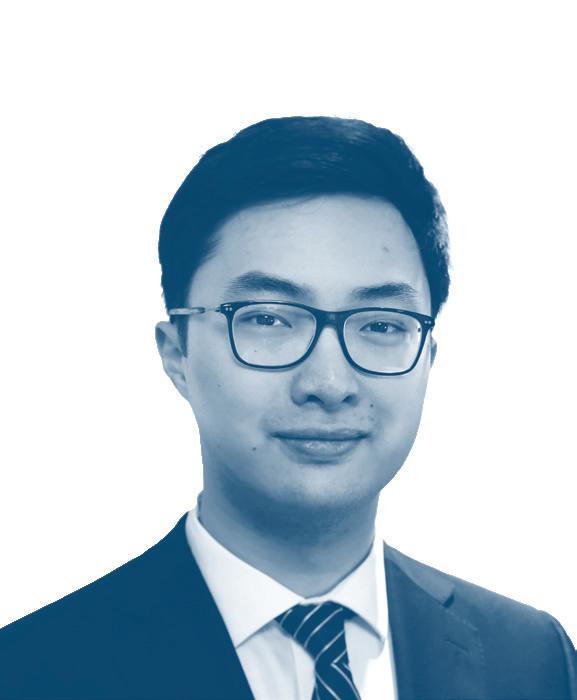
Shicheng (Tony) Jin
Student, DPhil Evidence-Based Health Care, 2022-27
“I eagerly anticipate contributing to Black History Month projects, particularly capturing narratives of Black women at Oxbridge.”
— Jean G. Beesley
me to allocate other funds towards living costs, fostering peace of mind, and enhancing my quality of life. Being a Cruttenden Scholar holds immense personal significance.
Kellogg College’s welcoming environment enhances my academic journey. I eagerly anticipate contributing to Black History Month projects, particularly capturing the narratives of Black women at Oxbridge. I recommend Kellogg College wholeheartedly, its friendly ambiance and supportive community make it an ideal academic haven.
Shicheng Jin describes his experience of pursuing his DPhil in Evidence-Based Health Care as ‘transformative’. His time has been marked by engaging courses, dedicated supervision, and immersion in the Oxford community. Collaborating with Dr Peter Scanlon, Head of the English Diabetic Retinopathy screening program, was a defining period, allowing him to refine his intellectual abilities through NHS interactions.
As a Resident Physician in Ophthalmology in Montreal while pursuing his DPhil, his focus on diabetic retinopathy involves advanced research methodologies, critical analysis skills, and valuable opportunities. The McCall MacBain Scholarship enabled his academic journey and inspired a commitment to community service.
Interacting with diverse scholars and students has made a lasting impact on him, contributing to his academic and personal growth. And the impact of the McCall MacBain Scholarship on his academic progress has fuelled his desire to give back to the community.
‘The Oxford-McCall MacBain Scholarship played a pivotal role in my academic journey. It relieved financial hardships and allowed me to focus on research and studies. Coming from a family with humble beginnings, the scholarship inspired a commitment to giving back to my community in Oxford, Canada, and globally. I aspire to bring my research skills back to Canada, contributing to healthcare improvement and supporting the next generation of health researchers and leaders.’
“Coming from a family with humble beginnings, the scholarship inspired a commitment to giving back to my community in Canada and globally.”
— Shicheng (Tony) Jin
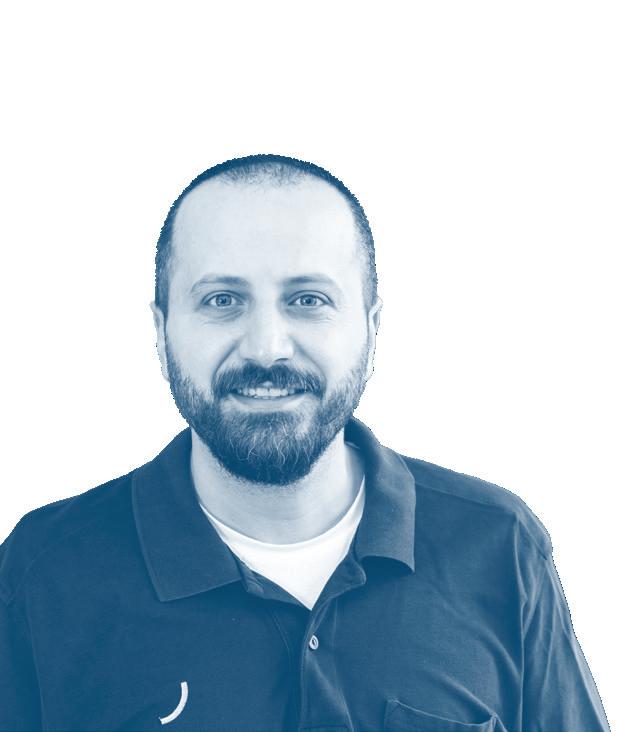
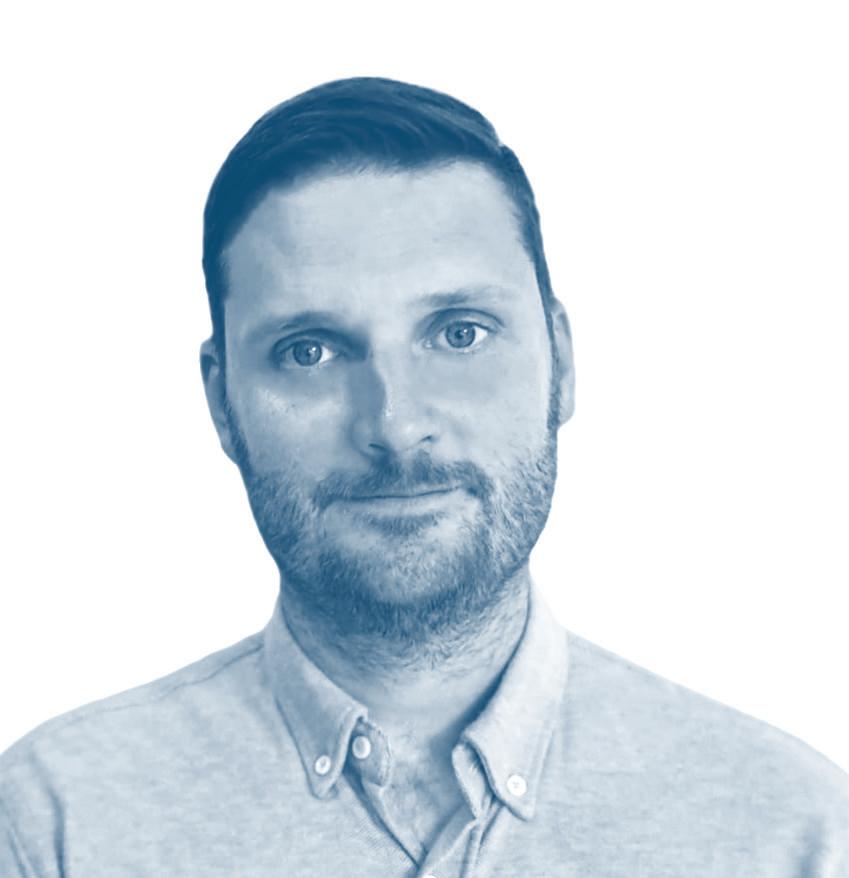
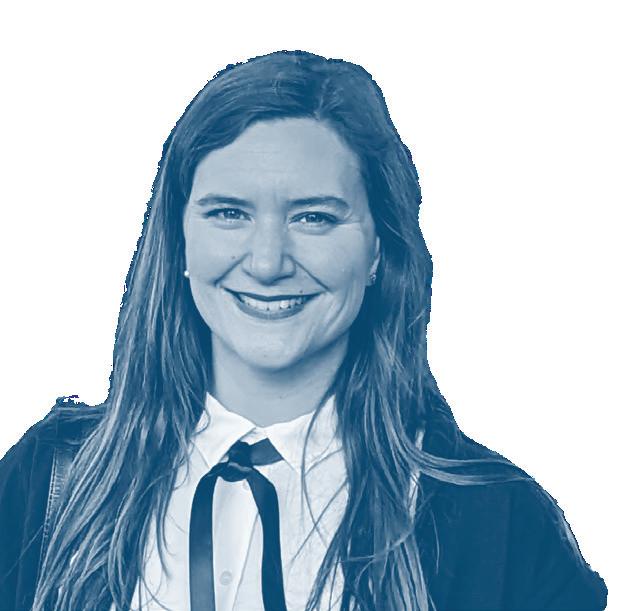
Rachel Kesselman
Student, MSt Creative Writing, 2023-25
Ali Mulhem completed his MSc in Evidence-Based Health Care in 2021. The program proved pivotal in his personal and professional development, connecting him with a diverse group of students and offering valuable insights and perspectives on healthcare around the world.
Subsequently accepted into the DPhil program with a McCall MacBain Scholarship, this opportunity marked a significant step toward becoming an independent researcher. The scholarship enabled him to develop essential skills for clinical research in his chosen field of neurosurgery, enhancing his ability and furthering his career. Engaging with the wider Oxford community through events and extra-curricular activities at Kellogg also contributed to both academic and personal development.
Financial support played a crucial role, alleviating constraints and allowing Ali to focus on academic pursuits.
Financial support played a crucial role, alleviating constraints and allowing Ali to focus on academic pursuits. Currently, as a full-time neurosurgeon, he finds immense fulfilment in clinical work, with post-graduation plans involving a continuation of clinical practice alongside research and academic endeavours.
‘The multifaceted experiences at Oxford, supported by the scholarship, have been instrumental in shaping my academic journey and future aspirations.’
Trevor Treharne has dedicated his academic life to evidence-based healthcare: an MSc and DPhil. With almost two decades of journalism experience, his interest lies in scrutinising how the media reports on health care matters. The DPhil has empowered him to integrate journalistic skills with evidence appraisal. Engaging with a medical community has been enriching, enabled by the McCall MacBain Scholarship.
‘The McCall MacBain Scholarship has been instrumental in enabling my education. Without it, I would have been unable to accept a place on the DPhil programme, given the financial commitments from previous degrees. The funding provided the necessary resources to embark on this academic journey.’
My writing delves deeply into themes of place, belonging, foreignness, and womanhood, drawing inspiration primarily from my personal experiences.
Exploring the concepts of home, familial obligations, nostalgia’s pitfalls, social mobility’s costs, and gender dynamics, my work reflects the complexities of human relationships.
Originating from the Coal Region of Northeastern Pennsylvania, my decadelong residency in Paris, coupled with the stark contrast between rural Pennsylvania and the vibrant city of Paris, serves as an ever-present muse.
A BA in French and English from Bryn Mawr College was followed by a master’s degree from the Sorbonne, where I obtained France’s secondary teaching certification. Balancing work and writing, I dedicated early mornings, weekends, and school holidays to crafting my debut memoir, Rachelle
Transitioning to my second book, I seized the opportunity to refine my craft and gain fresh perspectives by applying to Oxford’s Creative Writing MSt program. The part-time, clustered learning format perfectly suited my needs..
I actively sought scholarships, as without financial assistance, pursuing my studies would have been impossible.
Kellogg College stood out to me not only for its Creative Writing Centre but also for its diverse international student
“My
writing delves deeply into themes of place, belonging, foreignness, and womanhood.”
—
Rachel Kesselman
body and inclusive atmosphere. Upon discovering the Part-Time Student Scholarship, I immediately applied.
The scholarship made my enrolment feasible, enabling me to immerse myself fully in my writing journey. I take immense pride in being a part of Kellogg and its diverse and vibrant student community.
The college’s welcoming environment fosters intellectual curiosity and provides a tranquil setting conducive to deep concentration. Kellogg’s Victorian campus offers the ideal backdrop for academic pursuits.
Looking ahead, I aspire to publish my current works in progress – a novel and a memoir – and ultimately pursue writing as a full-time endeavour.

The establishment of a reading room and a special collection at Kellogg embodies Kate Tiller’s commitment to fostering a distinctive approach to studying local history. Kate has donated her substantial book collection, amassed over decades. ‘I’ve offered the legacy collection to support present and future students in their studies, provide access to materials, and enable students to enjoy discovering fresh and varied ideas. It is what the current director of the MSc in English Local History calls the “browsability” of the subject and the collection’. She continues, ‘I would like it to be a go-to place in College for today’s and future students, and perhaps tutors as well.’ The reading room serves as a symbol of Kellogg’s commitment to creating an open and exploratory learning environment.
Kate attributes the success of local history at Kellogg to its unique blend of geographic diversity and interdisciplinary studies. ‘Local history is far from parochial.’ she asserts. ‘It draws individuals with knowledge from various geographic areas and diverse backgrounds. The interplay between local and social history, landscape studies, environmental concerns, and even elements of religious, community, and political studies, creates a rich tapestry of shared questions and comparative focus. Students pursuing original material bring fresh evidence to the subject, fostering dynamic debates.’
Kate Tiller’s journey at Kellogg mirrors the College’s evolution into a dynamic centre for local history, equality, and pioneering educational programmes.
Leaving a gift to Kellogg in your will is one of the most powerful ways to help us continue to champion lifelong learning.
With your support, philanthropy will create far-reaching opportunities for students in the future, boosting our efforts to enable, inspire, nurture and grow the next generation of change-makers.
Anyone who pledges to leave a gift to Kellogg will be invited to become a member of the Vincent Strudwick Society which has been established to thank and celebrate all those who have so generously decided to include Kellogg in their will.
Leave a gift in your will
To find out more, please visit: www.kellogg.ox.ac.uk/leave-a-gift-in-your-will
“Local history is far from parochial.”
— Kate Tiller
As a testament to the college’s legacy, Kate’s contributions have not only shaped the academic landscape but have also paved the way for future generations of scholars and leaders. Kate’s collection, coupled with Kellogg’s commitment to inclusivity, innovative education, and the exploration of local history, ensures her enduring legacy for generations to come.
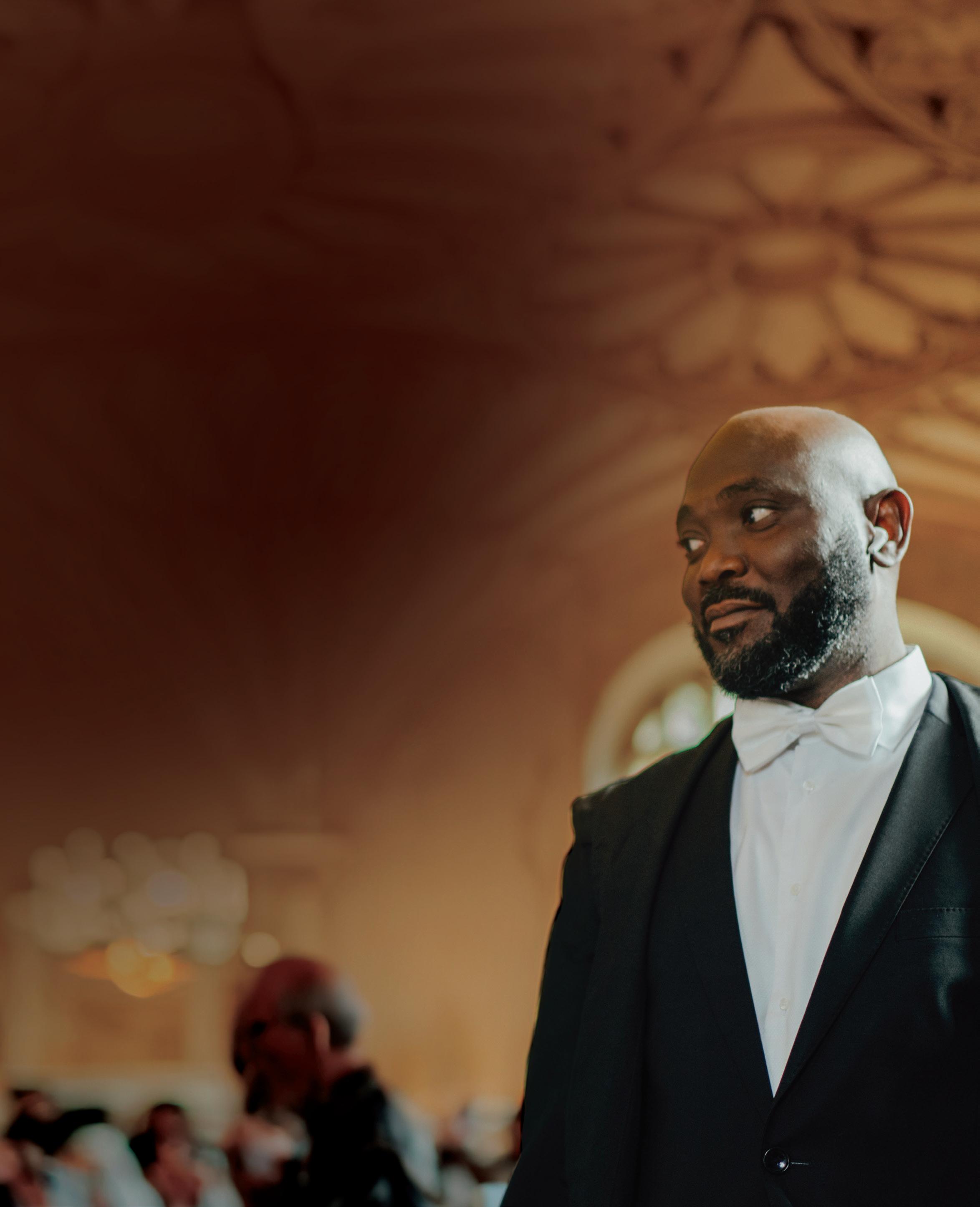


GCHU research highlights crucial intersection of climate change, health, and inequality.

OFrom eco-conscious practices to innovative green technologies, sustainable living is an integral part of the modern agenda in business and in everyday life. Kellogg not only aims to operate sustainably itself, but through its researchers and outreach is adding to the conversation on how we achieve a harmonious coexistence with our planet.
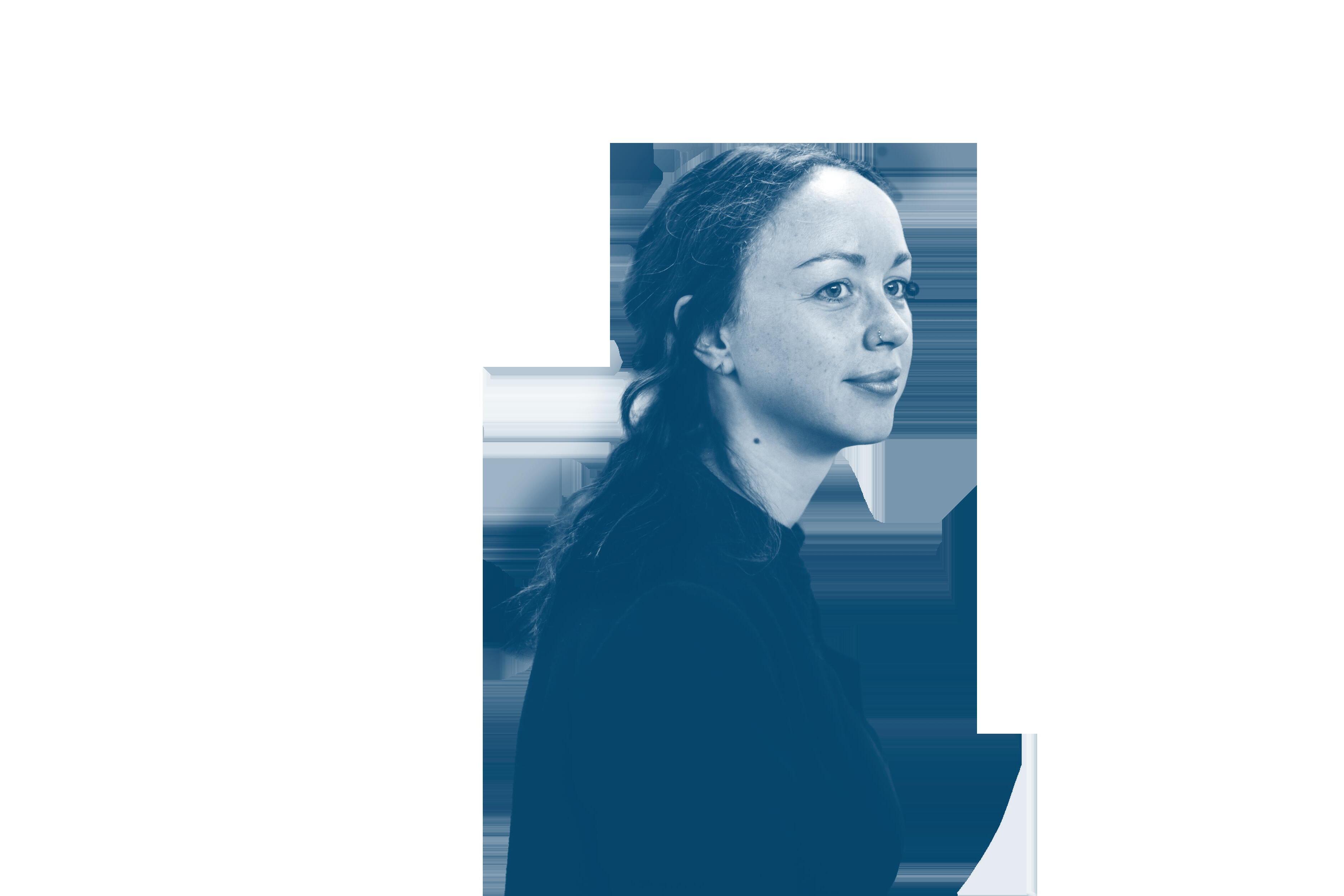
ver the past year, researchers at the Global Centre on Healthcare and Urbanisation (GCHU) have been at the forefront of investigations emphasising the indispensable need for collaborative efforts in research, policy, and practice to comprehend the profound impacts of climate change on both human and planetary health.
In a paper by GCHU ‘Assessing housing exposures and interventions that impact healthy cities: a systematic overview of reviews’, researchers identified various factors (eg, poor housing quality, lack of green and blue infrastructure, mobility and transport) contributing to the widening health disparities. GCHU projects, such as Street Voice – a Citizens’ Jury, seek to identify solutions to the impact of travel on health and climate
GCHU’s recent research underscores the critical nature of this interdisciplinary approach, as the climate crisis emerges as one of the most significant threats to public health. A focus on the United Kingdom reveals stark disparities in healthy life expectancy at birth between the most and least deprived areas, with geography emerging as a central factor influencing these health inequalities. Between 2018 and 2020, the gap stood at 18.2 years for men and 18.8 years for women.
Continues on next page.
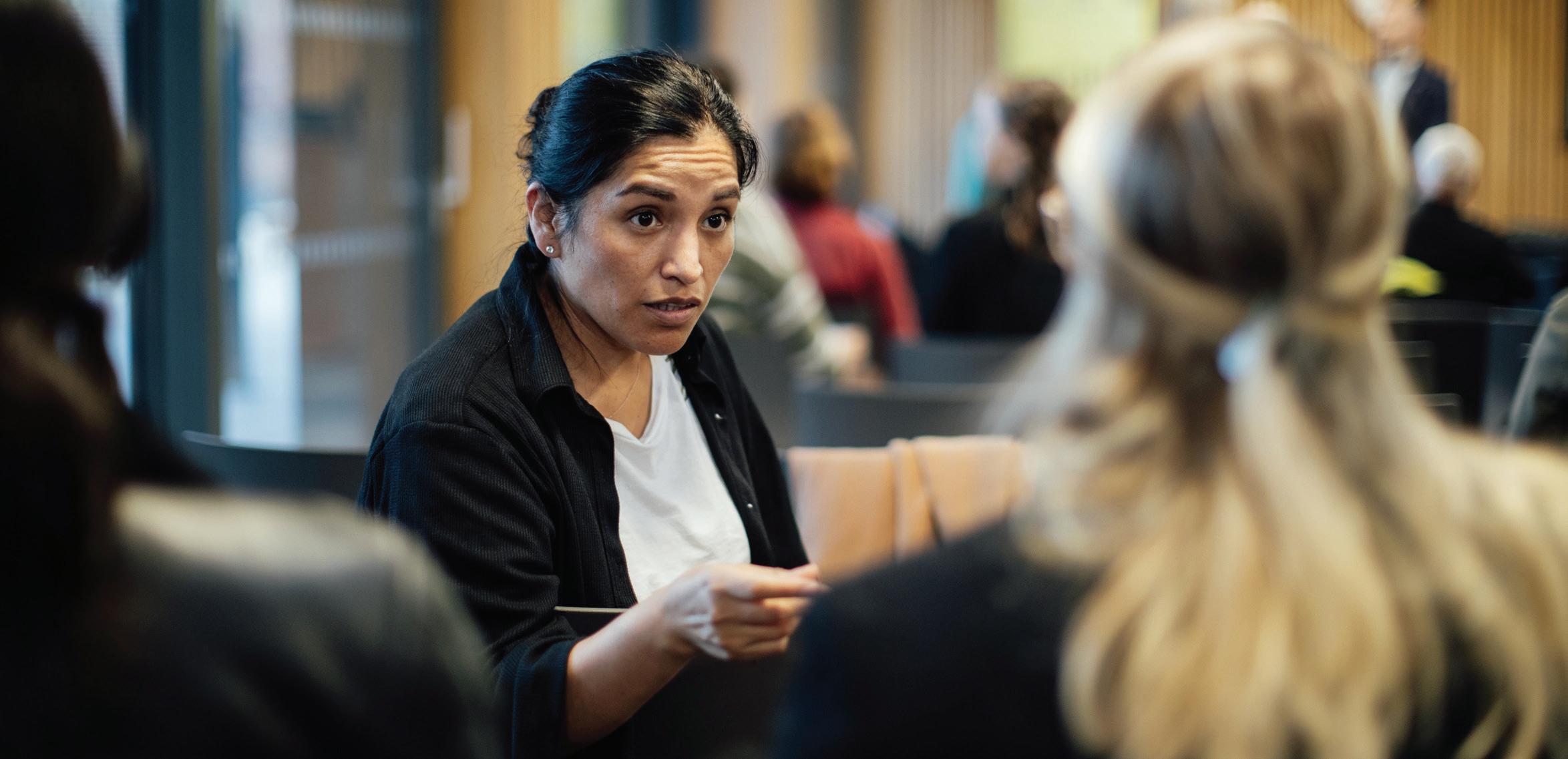
Healthy planet, healthy people continued.
change in Oxford, delving into the interconnectedness of different sectors and policy areas crucial for emission reductions, and underscoring the significance of geography in implementing effective climate solutions.
GCHU’s commitment to addressing global challenges with localised solutions is evident in its emphasis on combining on-the-ground actions with policy research. The 2023 APCC Report co-authored by GCHU researcher Dr Krisch shows that structural change is essential to make climate-friendly and healthy living accessible for all. This means targeted and coordinated action oriented towards a common good that is aware of the conflictual nature of social conditions, negotiating them with democratic legitimacy.
Recognising the need for diverse voices in promoting climate action, GCHU focuses on fostering meaningful exchanges between research and practice in government and communities. Its research highlights the importance of including communities in discussions to bring about transformative change and climate action. Building networks, seeking the right partners, employing both bottom-up and topdown approaches, and involving individuals in decision-making processes are integral components of GCHU’s research initiatives, and its efforts to create sustainable solutions for a healthier planet and population.
Recognising the need for diverse voices in promoting climate action, GCHU fosters meaningful exchanges between municipalities and communities.

If a company agreed to this operational data being audited, we would have our answer.
Many companies claim to be committed to environmental sustainability. Many claim to have strategies to become ‘net zero’ emitters of carbon dioxide. Glossy brochures promote their claims – printed on recycled paper, of course. But can they be believed? This is a major challenge in the global effort to avoid a climate catastrophe.
One answer is to look at the day-today operations of the company, to see what they are actually doing, and with what effect on the environment. Those operations tend to be driven by software. If a company agreed to this operational data being audited, we would have our answer.
The Commission seeks to:
Bring together software and vendor companies to prototype universal and auditable datasets.
Promote the idea that auditable datasets can be constructed via the auto-logging of transactional data.
This is the purpose of the Commission on Sustainability Data. The Commission is examining how this operational data might best be captured and disseminated, so consumers and investors could judge the environmental sustainability of a company’s operations. This would empower consumers with the means to factor in the environmental footprint of their purchases, and investors to incorporate sustainability considerations into their investment decisions.
The Commissioners include Oxford software engineering Professors Jim Davies and Niki Trigoni, as well as Bynum Tudor Fellow Bryn Roberts, the Global Head of Operations for Pharma Research and Early Development at Roche.
Inform governments how they can improve sustainability datasets by tracing back to transactional data.
Give companies the ability to automatically log transactional data at the click of a button.
Work with auditing firms and sustainability standards groups on how the auditing can be done while ensuring appropriate corporate privacy.
“Change will come by working together and making it easer to embrace decisions that will sustain our world, rather than carry on as though there are
no limits – or as though our actions have no consequences.”
— Kellogg College Bynum Tudor Fellow His Majesty King Charles III, in the keynote address to COP28
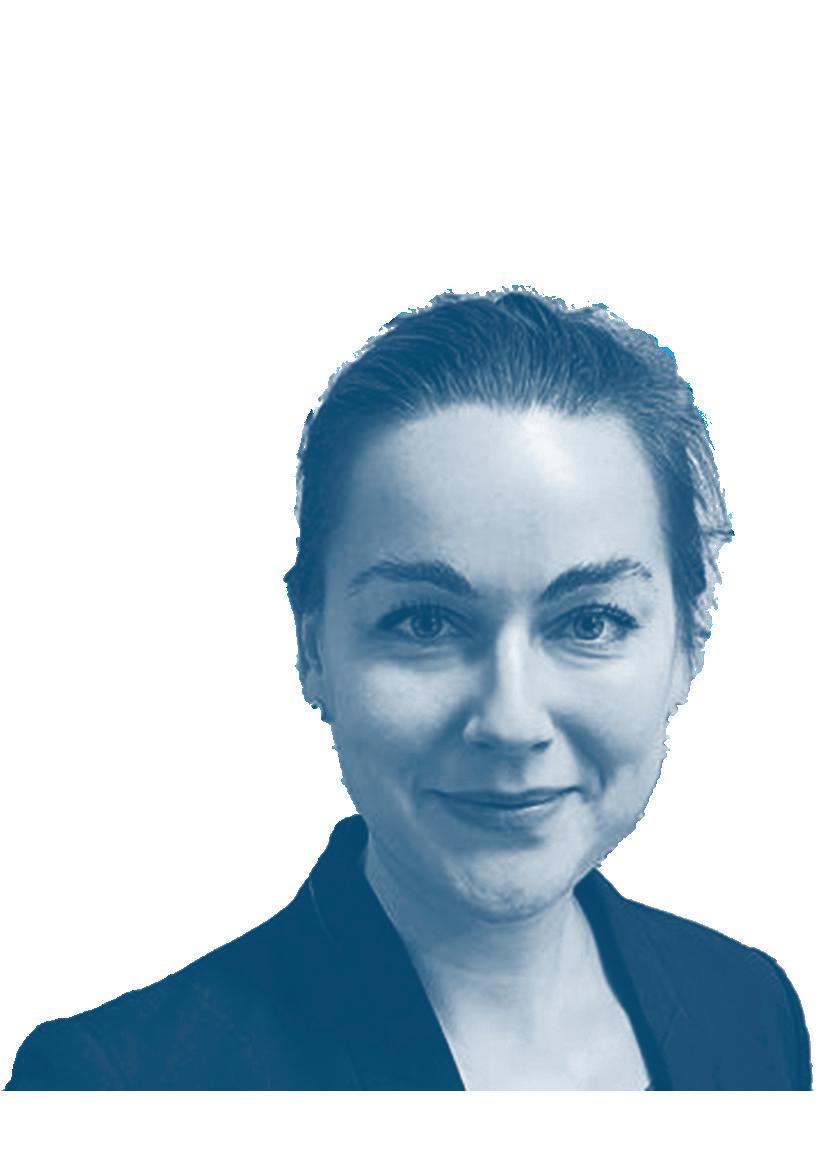
Johanna is an applied environmental economist with a focus on fiscal and climate policy. In her research, she uses econometric methods for causal inference and large microlevel datasets to evaluate policies.

Johanna works as a postdoctoral research associate within the Greenhouse Gas Removal Hub (CO2RE) at the Smith School of Enterprise and the Environment. At CO2RE, Johanna is particularly interested in the workings of different policy instruments to support greenhouse gas removal.
Prior to completing her PhD in Economics at the Mercator Research Institute on Global Commons and Climate Change and Berlin Technical University, Johanna worked at the Organisation for Economic Co-operation and Development’s (OECD) Centre for Tax Policy and Administration. While at the OECD, she designed and led research projects on energy and carbon taxes, and emissions trading systems, in close exchange with national policymakers. Johanna will be moving to the Hertie School in Berlin as Assistant Professor of Economics and Sustainability, but intends to remain an active member of Kellogg.
Stuart is currently engaged in research at Oxford Net Zero and the Environmental Change Institute, School of Geography. His research focuses on the convergence of physics and climate change policy, specifically delving into the design, assessment, and physical prerequisites of net-zero policies across different economic sectors.
Stuart’s interests extend to regulatory policies related to fossil fuel extraction, net-zero strategies for challenging industries and aviation, as well as the development and application of
greenhouse gas (GHG) metrics, carbon/ GHG offsetting, and cost-optimised national, multinational, and global mitigation policies. During his DPhil, Stuart collaborated with various stakeholders on policy-relevant projects, demonstrating his commitment to translating research into practical applications.
Stuart’s research continues to explore the nexus between climate physics and the design of effective policies, showcasing a continued dedication to advancing knowledge at the intersection of scientific principles and policymaking.
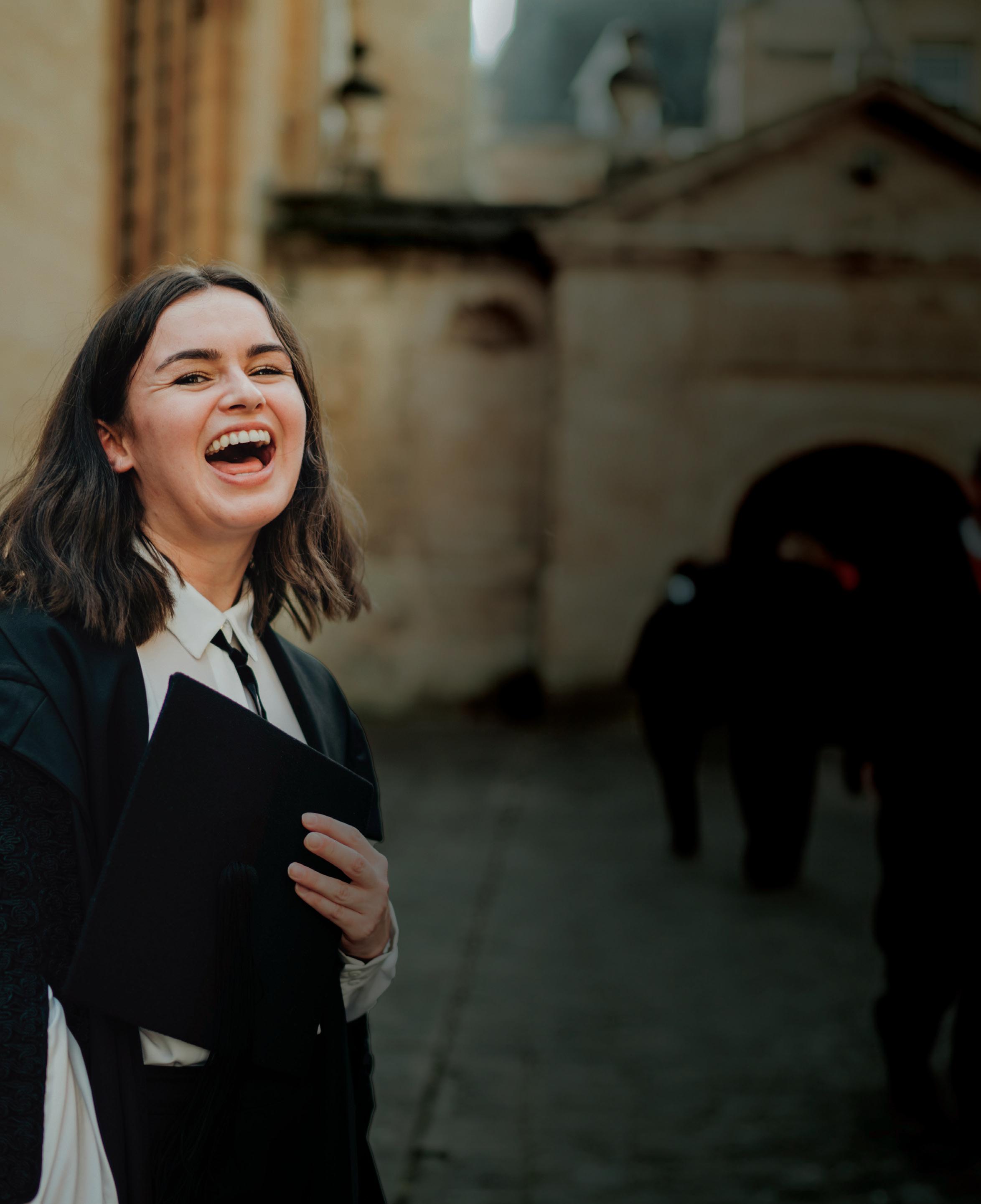
Launched as part of the college’s 30th anniversary celebrations, The 1990 Club recognises those who make regular gifts to the college.
Help us to move forward with projects that matter most to Kellogg, and make a difference to college life.

Become a member today
Please get in touch with the Development Office at 1990Club@kellogg.ox.ac.uk or visit www.kellogg.ox.ac.uk/supporting-Kellogg/ 1990-club